All pictures courtesy by the artist
Copyrights © 2020 Fiora Garenzi
Design-Developed by Maureen Leprêtre aka ReussMaureen.com Font: Rasa © 2015 by Rosetta Type Foundry s.r.o.
-

Old BP camp
-
« The situation in Calais right now is very complicated. As it has always been, we don’t have enough food and we cannot sleep at night because of the cold. We know many organisations are trying to help us but it’s not enough. There are many sanitary problems and it’s not easy to stay clean and maintain good general hygiene in camps when hundreds of people are living together. Many people in the Jungle are sick because of the living conditions or because of animal or insect bites.
In the last few weeks the situation has been getting worse. I am living in the Hospital camp which is really big and has many different people from different cultures and countries staying there together, which creates many tensions. Many smaller camps have been evicted by the police in the past days, so the population of the Hospital site is getting bigger and bigger and there are more and more fights.
During the lockdown due to the coronavirus crisis less boats were crossing therefore less people have been able to reach England. The small boats have become a lot more popular in the past few months - it was rare to cross between France and England by inflatable boat before because it is so dangerous. It’s also a time were we feel pressure to cross as soon as possible because Brexit is coming very soon and the people are scared they won’t be able to cross after this, so they are ready to take huge risks to cross right now. »
In 2016 the Calais Jungle was dismantled. More than 8000 people were living there before the demolition. Sadly the mythic name is still bequeathed from refugee to refugee to describe the new camps installed around Calais, Dunkirk and cities on the northern French coast looking out across the sea in the direction of Britain.
Living in the camps are mainly people from Syria, Sudan, Afghanistan, Iran, the Kurdistan Region (Iraq-Syria-Iran) and Eritrea, but also people from other African and Arabic countries. They stay for days, weeks and sometimes years, stuck on the last step of their journey to reach the UK. They arrive from countries that are at war or under oppression. Due to this they have issues with passports or visas. Most of them are dreaming of reaching the UK where the papers are easier to obtain, where they have friends and sometimes family. Here they hope to have an ideal, safer and easier life.
The year 2020, marked by the coronavirus crisis, the lockdown in France and Brexit looming in the UK, is a time of change and additional difficulties for the refugees. With the lockdown came a reduction in the number of trucks getting to England. The Zodiacs (inflatable boats) therefore quickly became the most popular way to cross the Channel, despite the high price and great risks involved. With the date of Brexit getting closer, the number of evictions by the police are significantly increasing, along other harassment tactics. On the 10th of September 2020, the French government decided to forbid non-governmental organisations from distributing food to the refugees in Calais, preventing them from accessing sufficient food, as a way of applying pressure and encouraging them to leave as soon as possible.
-

Old BP camp
-

Old BP camp
-

-
« I left Sudan on the 20th of February 2016 because of the civil war. I was born in Darfur and the situation there is very complicated. Things there have still not improved. For young people there is no hope to have a good life in Sudan when you come from Darfur. You’re part of a minority that the Arabic government doesn’t want involve in the society. My mother and my brothers are still there, living in a camp in Kutum. Many villages have been destroyed and people have taken refuge in camps. Our village was burned and many people were killed.
I crossed the western border to enter Chad. I stayed there for one week, looking for a car to take me across the border to Libya. I finally met some people going to Niger. I was on my own so I followed them. I worked for two months in Niger at a gold mine, digging the ground to make a bit of money for the next steps of my journey. In April 2016 I crossed the northern border to enter Libya. In Libya I worked for another four months. With the money I made I was able to pay a smuggler to cross the Mediterranean Sea. There are many smugglers in Libya. They make you cross with so many other people. I was waiting in a garage for nearly two months until the smugglers gathered 1500 people from all around Africa, all looking for a way to cross the sea. They divided us into different boats; my boat was very old and made out of plastic. 137 of us were on it. We left at 9 o’clock at night and we lost our way in the middle of the sea. Luckily, a big ship saw us and sent a small boat to rescue us. We all got on the big ship and three days later we arrived in Italy. This was in October 2016. In Italy some people separated us into different groups and sent us to different camps around the country. I was sent to a camp in Atalanta by bus with seventy other people. I met some people there who became my good friends. They told me I should try to go to France where life would be easier. I spent one month in Italy. On the 1st December I left for France. I spent seven months in La Chapelle’s camp, in Paris. Then I went to Brussels where I spent one year and one month trying to get to the UK. We went several times to a port where many lorries going to UK were parked. One time we got into the lorries but unfortunately there were CCTV cameras and the police arrived. They took us to a detention center where I spent one month. After this I decided to return back to France. I tried to cross from Lille a few times. I am still trying, always on lorries. One day I will make it.
When we cross in lorries we go in groups of six or seven people. One person opens the door of the truck and we hide ourselves inside, behind the load. It’s very difficult to cross because of the three gates on the UK border, but many people have made it. The first gate is where the port’s security come to search inside the truck. If they don’t find anyone they bring the dogs. This is the second gate; the dogs can smell if there is someone inside. The last gate is the laser; they scan the truck to see if there are people inside.
The small Zodiac boats just arrived in France recently. During the lockdown there were no lorries going to the UK so people started to use Zodiacs because they had no other choice. They are very dangerous.
I have a lot of friends in the UK. There are many people I’ve met during some steps on my journey who made it and they have asylum papers now. I know it’s more simple to get the papers there and I also speak English so I know my life would be easier in the UK. I want to study sciences. I really love it but now I’ve lost many years of my life and am nearly 29 years old. I am still motivated to study but maybe I would pick up another subject which could allow me to get a job quickly. First, I would need to improve my English to be as good as English people. It would take me maybe ten years to be good enough in English and to study science. I feel a bit tired now. I would like to settle down, so maybe I will choose something easier. But I really want to do something nice of my life. I don’t know what I can do. Right now I need to reach the UK and get the papers. I have so many things I want to do but I am trying to not think about them now. It’s not the right time. »
-

-
« I am 25 years old and I come from Palestine. My wife and son are still in Gaza. I haven’t seen them since I left my country, two and a half years ago.
When I left Gaza it was a city that had been broken by the war. It was trying to return to a normal atmosphere but there were destroyed buildings everywhere and the attacks never stopped. Rockets were hitting the city often and people were still killed when they tried to protest against the blockade of the area by Israel. Under this blockade you feel like a prisoner of your city. Israel controls the electricity so most of the time we only get power for a few hours a day. The economy collapsed and people cannot work to make a living for their families. You have no hope for your future in Gaza.
I left to find a safe place where I could work, where my family could have a happy life. Where we would not be scared every time we hear a weird noise or see something in the sky.
I went by car to the border with Egypt. There you can pay a smuggler to cross for one or two thousand dollars. Once I was in Egypt, the army stopped me and detained me. They asked me questions for hours before letting me go. I took a flight to Turkey where I got a tourist visa for two hundred dollars. At this time I still had my passport and everything was easier because I could show that I was coming from Gaza and people understood my situation. I crossed Turkey without any problem with my visa and reached Izmir (a city on the west coast). From there I tried to cross to Greece on a small boat with a smuggler, but the police caught me three times. Every time I spent seven or eight days in jail. It costed me 1300 dollars to cross to Greece. I spent nine months on an island in Greece, sleeping in the street with some other guys, eating basically nothing. After these nine months I got some papers from Greece explaining my situation.
I hid myself in a boat going from Greece to Italy. In Italy I took a Flixbus to Belgium but the bus stopped in Germany for a check and the police found me and sent me to Austria. After two days I took another bus and I finally reached Belgium. I went directly to the police station to ask for asylum but they refused because Greece already took my fingerprints. I didn’t want to go back to Greece. There the police were very aggressive and I had no help. I was just sleeping in the street and I couldn’t do anything. In Belgium the police took my passport so I was without identity papers. I decided to go to France. I took a train to get there and the police stopped me in Lille. I met a nice policeman who saw I was from Palestine and he just asked me to get off the train. After this I took another train to get to Dunkirk. I have been in this camp for one month. I want to try my luck in England. I think there I could obtain the papers. I tried to cross one time on a small boat with a smuggler. On a very small boat for a maximum ten people he put thirty-five people. The water flooded in and we had to go back to the coast. One of the other people on the boat was very mad. He took a big knife out of his pocket and he hurt the smuggler. We were all very scared we ran far away back to the camp. In Dunkirk there are not many people from Palestine. Right now there are just four of us and we were all on the boat that night. Now we are waiting for another chance.
It’s very difficult because when I left two years and a half ago, I wanted my family to join me in Belgium. But now I have lost so much time that even if I get to England I don’t know if my wife will still want to join me. She thinks I am taking too much time to find a safe place for our family and she doesn’t want to wait for me any longer. It’s very complicated when the person you love, the reason which pushed you to leave, doesn’t believe in you anymore. I am now wondering why I started all this travel. I hope the future will bring some light into my life. »
-

Personal belongings on Sangatte beach
-
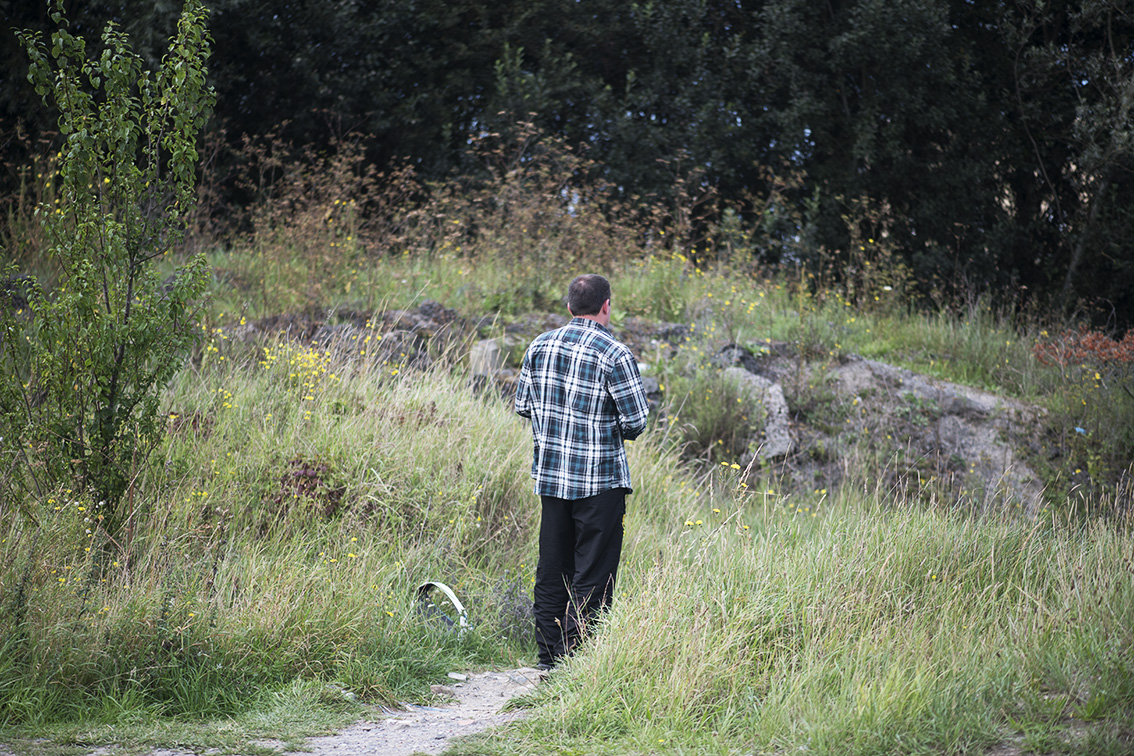
-
« I come from Iran. I worked there as an auto mechanic.
In Iran there are some really old religious rules. I am not Muslim but in strict Islamic countries you do not have the freedom to be religious or not. Even if you don’t believe you have to submit yourself to the Muslim rules imposed by the government.
For example, I was working one day with my mother in the street and the police came up to us and said there was a problem with the way my mother was dressed. They said her scarf was letting too much of her hair show. I was young and remember the police becoming violent with my mother. They forced her to wear the hijab, totally covering her hair even though we were not Muslim. As an atheist I could never find my place in an Islamic country, always putting pressure on you as soon as you’re in a public space. Forcing you to follow a religion that is not yours.
I fought many time with the police in Iran. Once they arrested me and were very violent. They told me, “this is an Islamic country - if you don’t want to follow the rules, leave.”
I didn’t want to leave. This was my home and I knew nothing else. But after they tried to arrest me again I knew I would have big problems if they caught me again. Some people helped me escape.
I left Iran more than four years ago. I was searched by the police and they took my passport. I crossed the border to Turkey illegally. Then I went through Greece, Macedonia, Slovenia, Austria before reaching Germany. In Germany I gave my fingerprints and asked for asylum. In Germany it was complicated. I was staying in a camp in the east, five minutes away from the Polish border. In this camp many ethnicities were mixed and there were many problems and fights. I spent three years and eight months in Germany. They eventually refused my application. I left Germany to go to Calais, France. After a few months in Calais, I managed to reach England on a small boat with a smuggler and some other people. I had spent a few months in England when I received a letter instructing me to go to the Home Office. I thought I had a positive answer to stay but when I arrived I they put me in jail. I spent one month in jail. They tried to send me back to Germany one time but I appealed. The second time they sent me back to Germany. When I crossed the border they took all my personal belongings including my phone. They gave me a receipt but I could never get my things back. I also lost all my belongings in England when they caught me. Reaching England had been my only goal for years. I was devastated.
From Germany I travelled back to Calais. I want to try to reach England again. It’s the only objective. The reason I endure this hard life in the camps and all of the complications is because I am convinced one day I will live in England. I speak English very well. I know I could find a job there. I could construct a nice life and be happy. »
-
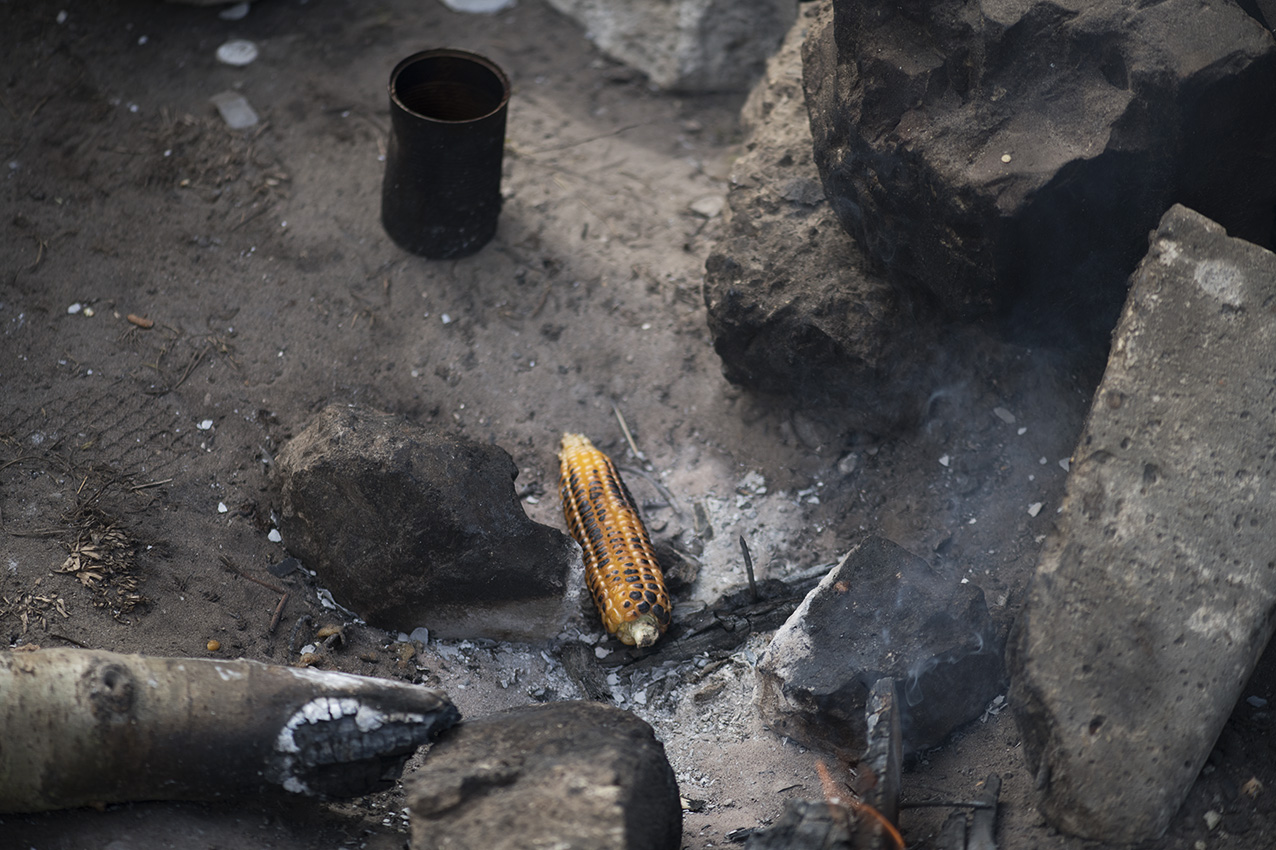
Old BP camp
-
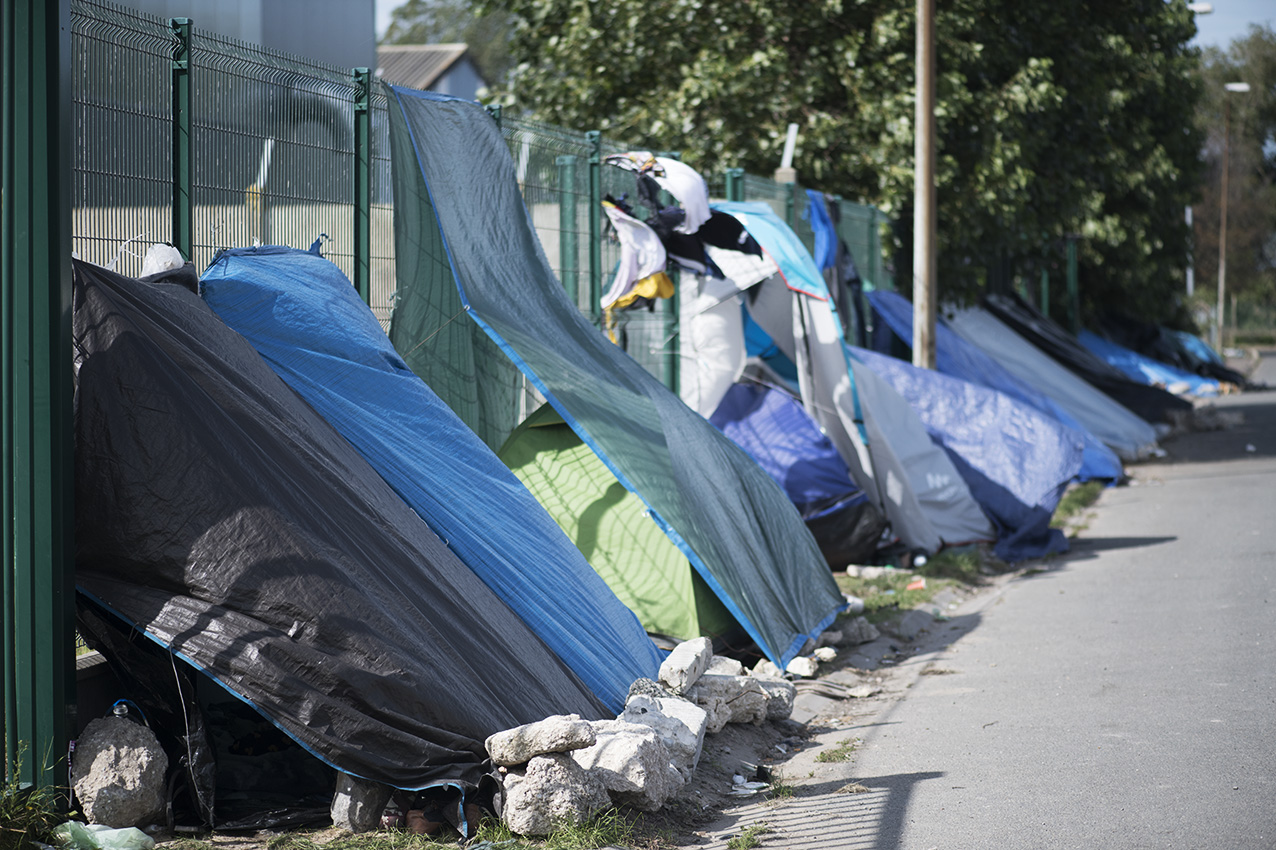
Old BP camp
-
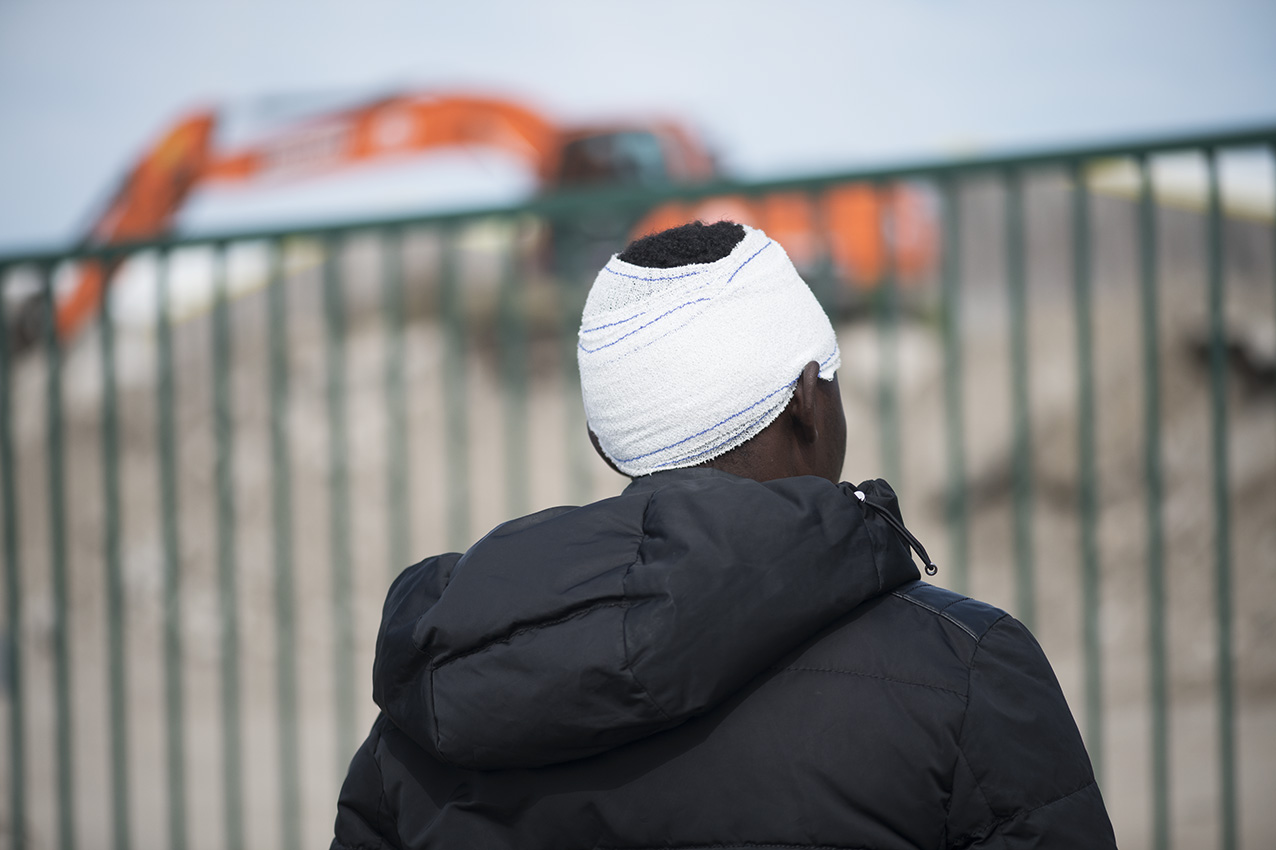
« Last night I tried to cross to England on a small boat. There were 30, maybe 40 people on a boat made for a maximum of 10 people.
After a few kilometres the police saw us. They came by boat to stop us and we all jumped from the Zodiac. Someone who jumped at the same time as me fell on me and for a few seconds I lost consciousness. I am very lucky I didn’t drown. »
-
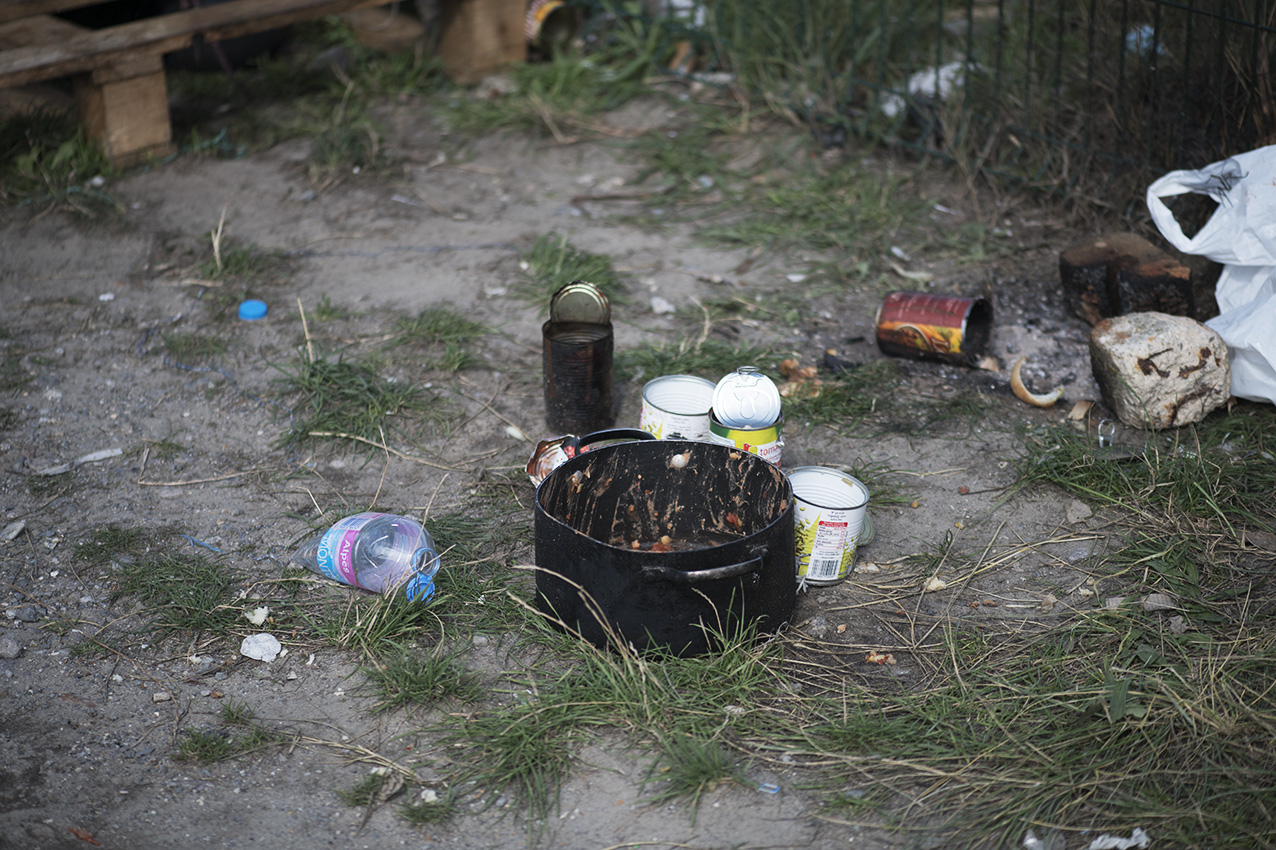
Old BP camp
-
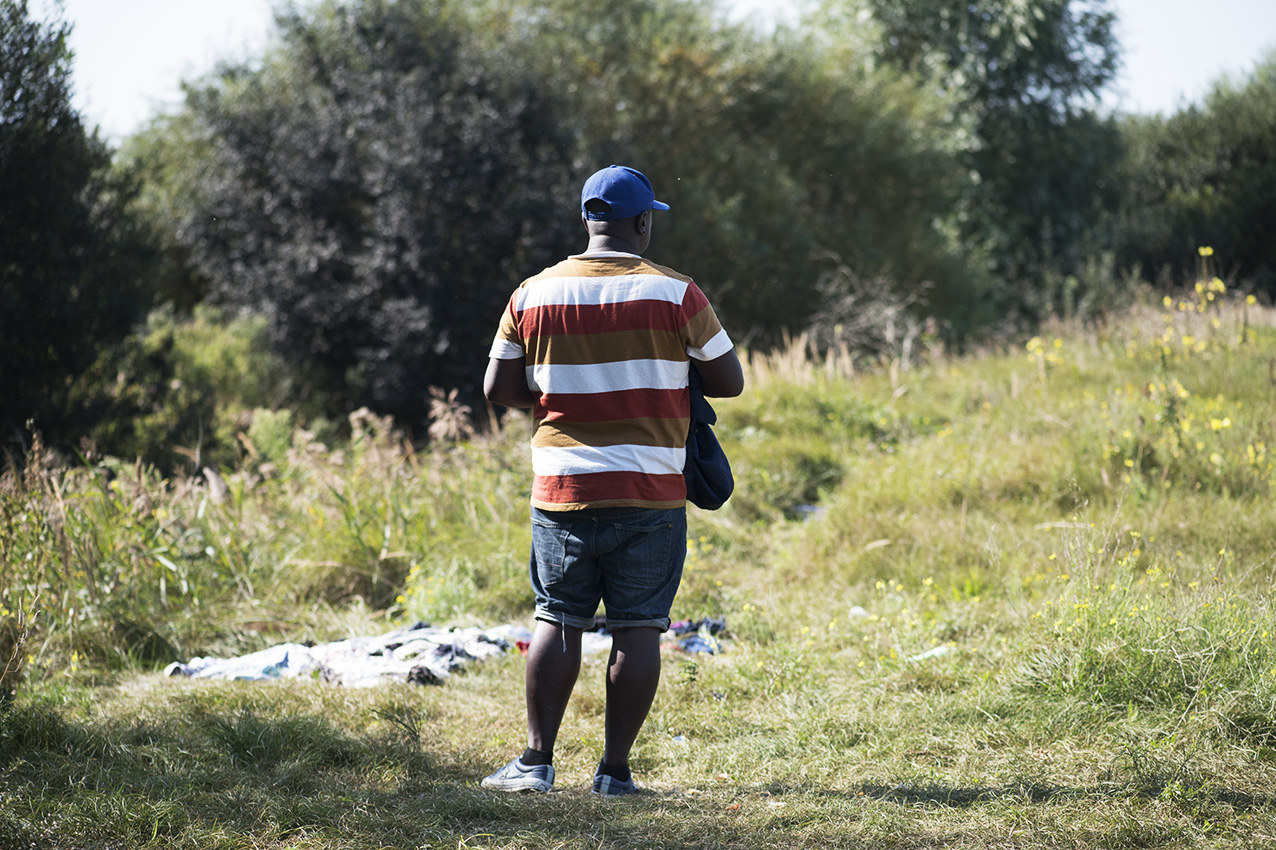
-
« I come from Addis-Abeba, the capital of Ethiopia. I left in 2012. I had studied abroad and after my studies I returned to my country where I started to work as a teacher. I really enjoyed teaching but I couldn’t agree with the non-democratic political system and the oppression of some ethnicities I found in my country when I returned. In Ethiopia the power has always been kept by the same regime, leading to societal oppression for members of minority groups. Together with some other people from my ethnic group, we decided to engage in politics. Our party started to get bigger and gained a lot of support from the population. We became the enemy of the state. I was arrested and spent three years in jail, during which time I was tortured. I had to leave my country or they would have killed me.
I took a Schengen visa to Germany and I decided to live there. I applied for asylum. After living in Germany for five years they refused my asylum application. They recognized my political reasons but refused to give me the papers because I had taken the plane to Germany, which they saw as a legal way. They thought my escape was not urgent because I was able to take the plane.
I appealed this decision but they refused again for the same reasons.
After this decision I left Germany for Switzerland. There I was confronted with the Dublin Regulation: Germany took my fingerprints so I had to go back there after two months in Switzerland. Stuck in Germany, living in a camp without any possibility of work and unable to do anything, I talked with other refugees and I heard some stories that in England it was easier to be granted the papers.
In October 2017 I arrived in Calais. I moved a few times and spent time in Belgium and Luxembourg before returning back to Calais. I tried to cross many times, mostly by hiding myself in the back of trucks to get onto ferries. The police always stopped me.
I want to go to England to show to myself I am free. From the black Americans discriminated by the system hundreds of years ago to my own personal position of African man, kept prisoner to his fingerprints in Germany, who just wants the freedom to live where he wants, I want to be the one that makes a difference. I want to be able to make my own decisions and I will do all I can to have my freedom. I didn’t choose the place where I was born and I don’t want it to influence my freedom of movement. No-one leaves his country for Europe because he thinks it’s the best place to live as a refugee: you do it because you don’t see any other option. In England, even if you don’t have the papers, even if they don’t give you asylum, you have the chance to live - to live truly, if illegally: you can work, you can have a house. For sure, it’s not good pay. But when you have lost years of your life, unable to do anything, just being able to work is already such a big step.
The Western people are not exempt from responsibility in the migratory flux of the last few years. Behind every beautiful car in Europe, there are big companies exploiting people in southern countries. In African countries run by dictators, Western countries have a big impact and a lot of influence. They could make a change, but they allow the situation because those poor systems controlling the people in Africa allow Western countries to have more and more power, to make more and more benefits. The migratory flux from the south is just a consequence of economic and political actions from Western countries. »
-
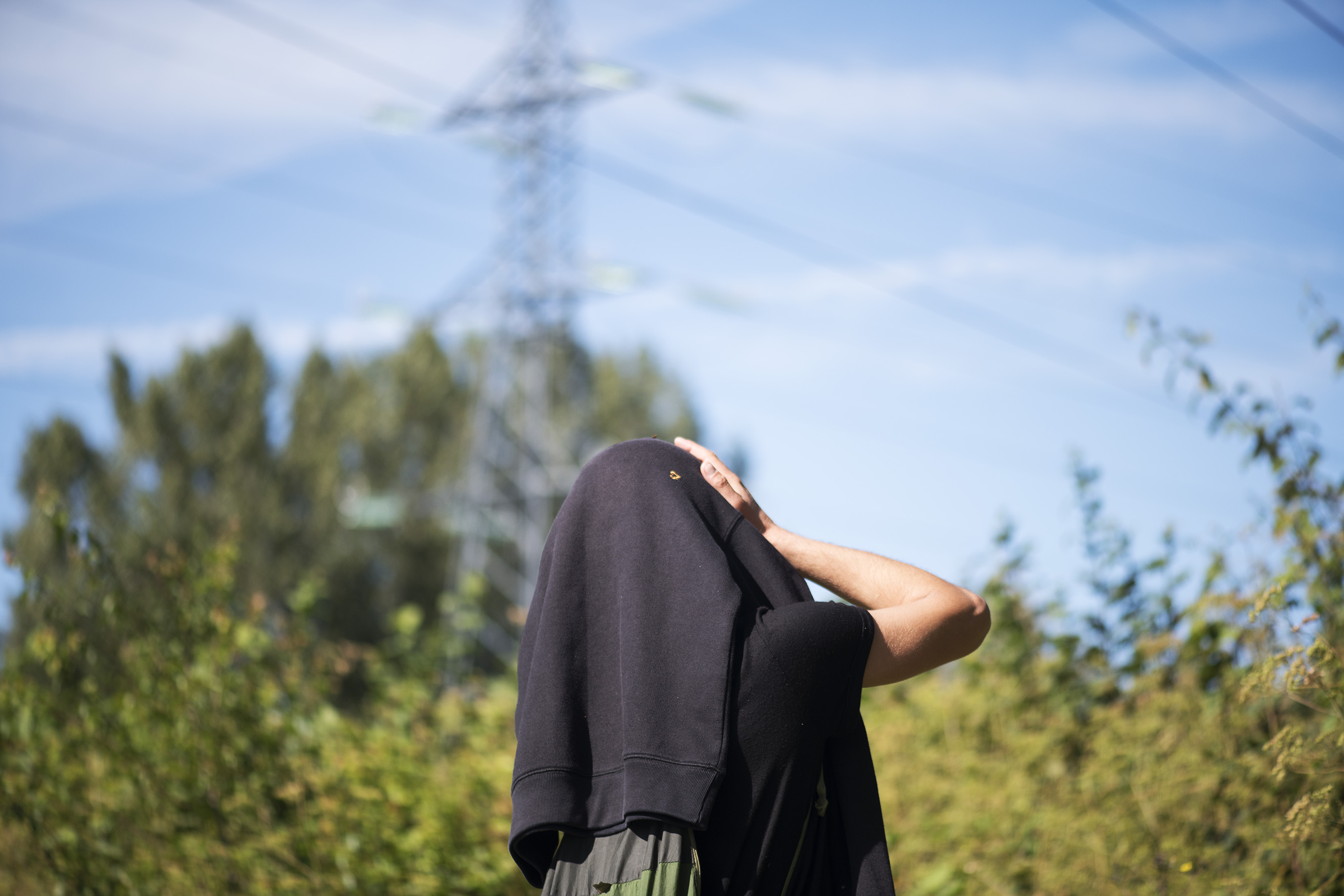
-
« I am 20 years old and I left Syria over a year ago. I am Kurdish and I was hoping for a better life than the one you can have as part of a minority group in Syria. I crossed the Syria-Turkey border in a big old car. There were many people, all sat on top of one another on the back seat. We were able to reach Turkey without much trouble. The border is not so difficult to cross if you know how to avoid the fighting and the army. From Turkey I travelled on a big liner going to Italy. I hid myself under a truck, just above one of the wheels. The journey took five days. For five days I didn’t eat and drank almost nothing. I didn’t move. I arrived in Italy and I travelled on a train to Paris, always finding a way to hide myself. I spent two nights on the street in Paris before taking another train to Dunkirk. I am in Dunkirk since one year and two months.
I want to go to England. I have tried to cross the sea more times than I can count - almost every day for an entire year but sadly I am not very lucky. Some people arrive in the north of France, spend only one or two days there and manage to cross. Some other people try hundreds of times before they make it. I haven’t tried with the Zodiac boat. It’s very dangerous and very expensive. The smugglers demand hundreds or thousands dollars. I don’t have enough money. I try to hide myself under the trucks, sometimes inside, but the police catch me every time. Sometimes I fall, sometimes I cannot hang on, sometimes there are problems with the trucks.
My cousin is in England and I want to join him. He doesn’t have papers yet so he cannot work legally but people in England are more tolerant. People are nice to him. I want to go to the North, near Scotland. It is cold there. I love it. I never loved the sun. I think there I could have a beautiful life, with tolerant people. In England everything will be easier. »
-
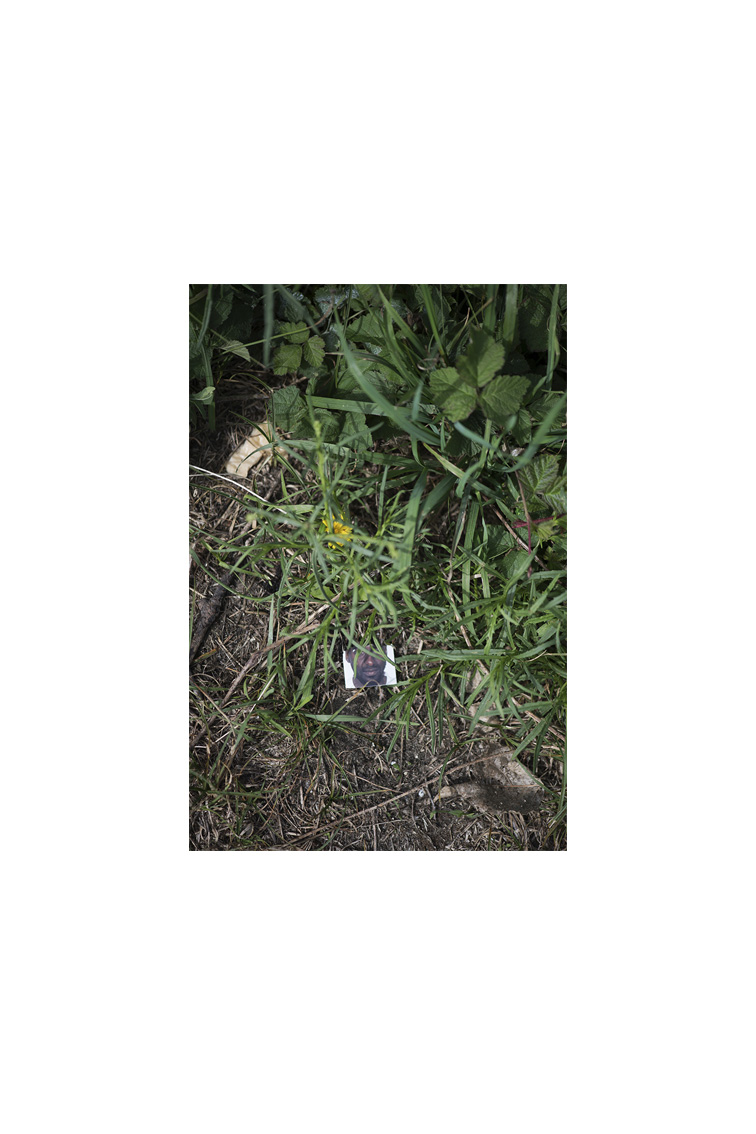
Old BP camp
-
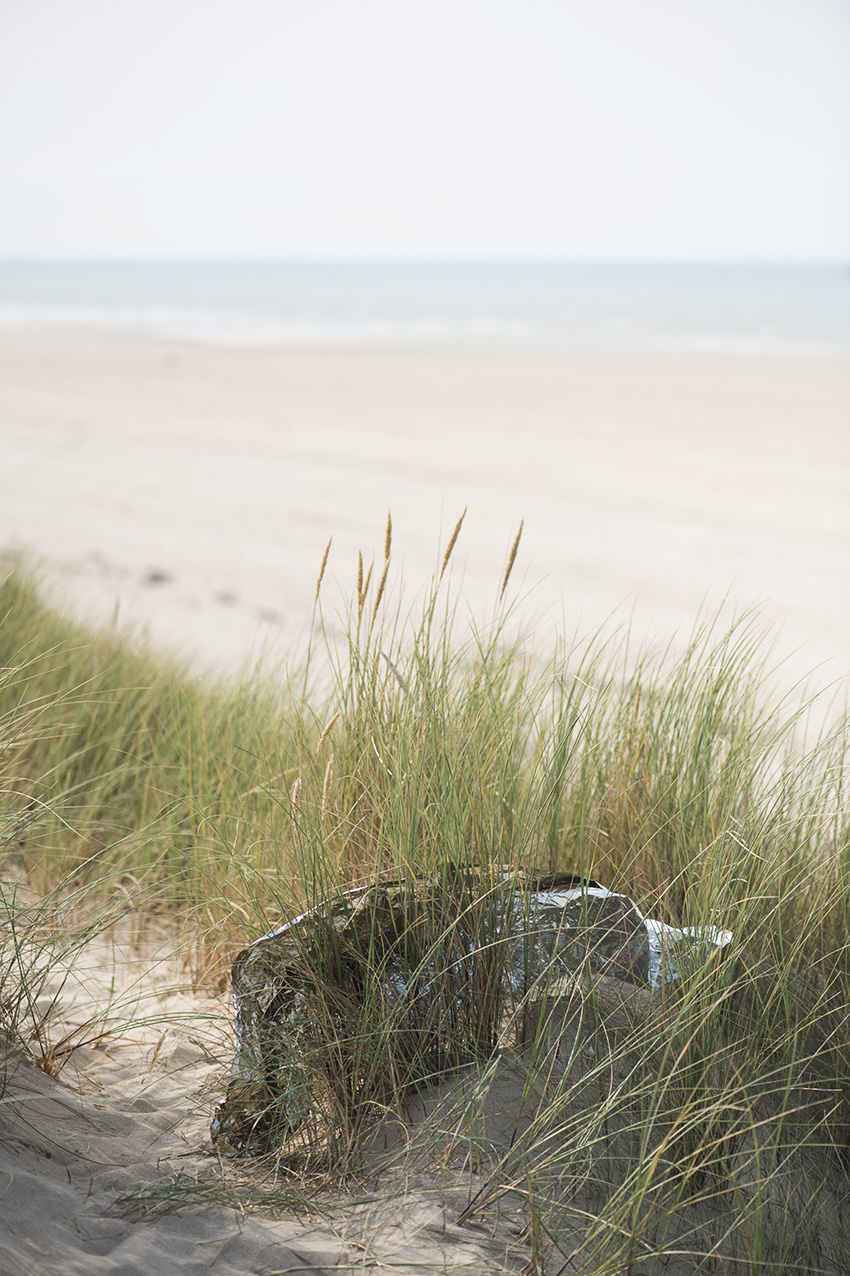
Survival Blanket on Sangatte beach
-
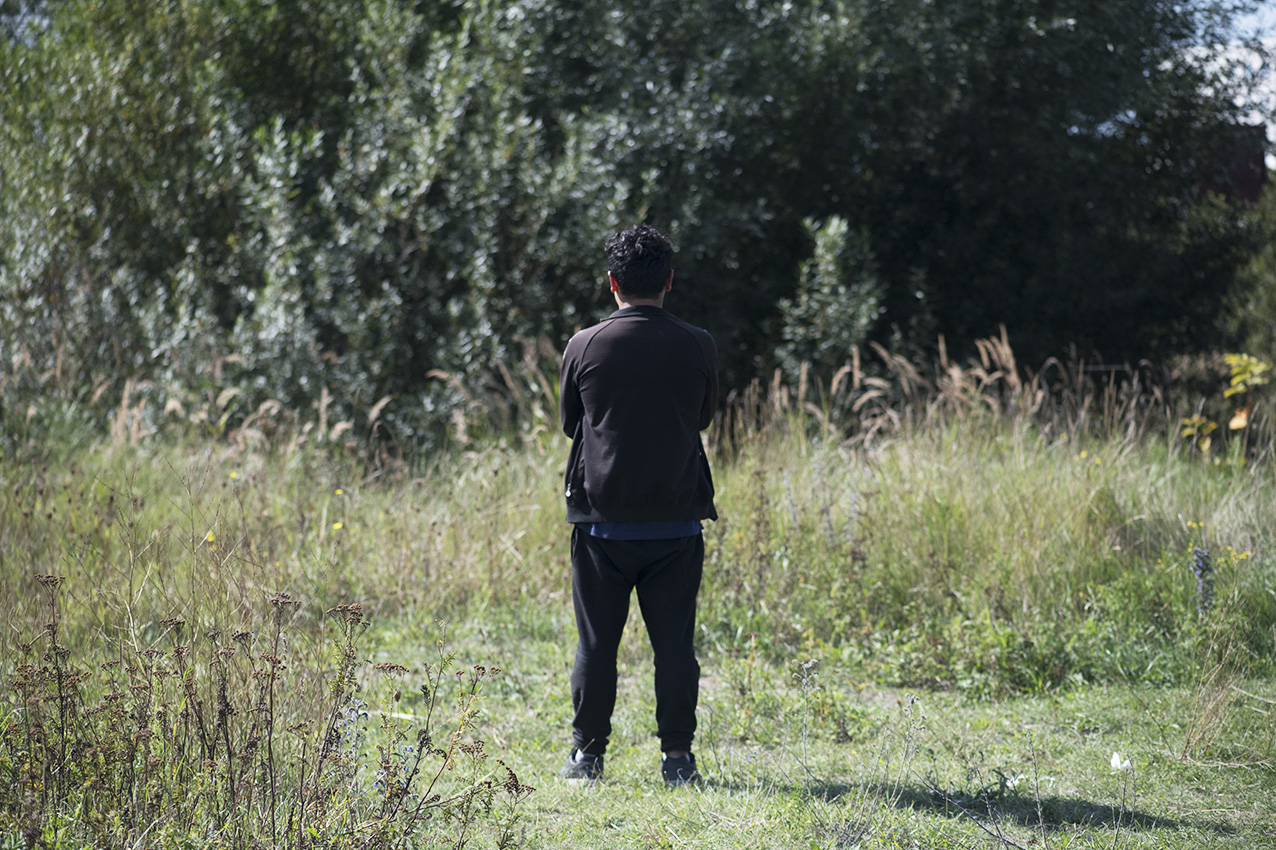
-
« I am 17 years old and I come from Syria. I left my country one year ago, in 2019, when I was 16.
I crossed the Turkish border but I didn’t know the way to get to Europe. I followed some advice and I went to Sudan, then Libya and Algeria, always following some people I just met. In Algeria I took a small boat to Spain. I was on the boat for more than 31 hours. We had no food, no water. At one point we lost our way. I thought we would never get to Spain.
I know I didn’t take the easiest route here because in Calais I met many people and they told me the way they took. But when I left I knew nothing. I was 16, speaking only Arabic. The only thing I knew was that I wanted to go to the UK. When you know nothing you have to follow advices given by people you just met. You have to trust them. You have no other option.
In Spain I didn’t want to give my fingerprints but the police caught me at the border with France, put me in jail for three days and then took my fingerprints. I didn’t have a choice and they were very violent. I left Spain after four days to come to Calais and I immediately crossed to the UK. Luckily I made it but after I put my foot on British territory the police arrived after just a few minutes and caught us. A guy told me to say I was 18 so I wouldn’t have problems, so I did. I didn’t know that if I had said I was 17 they wouldn’t deport me. They sent me back to Spain because of my fingerprints. I just arrived back in Calais. I have been here five days. »
-
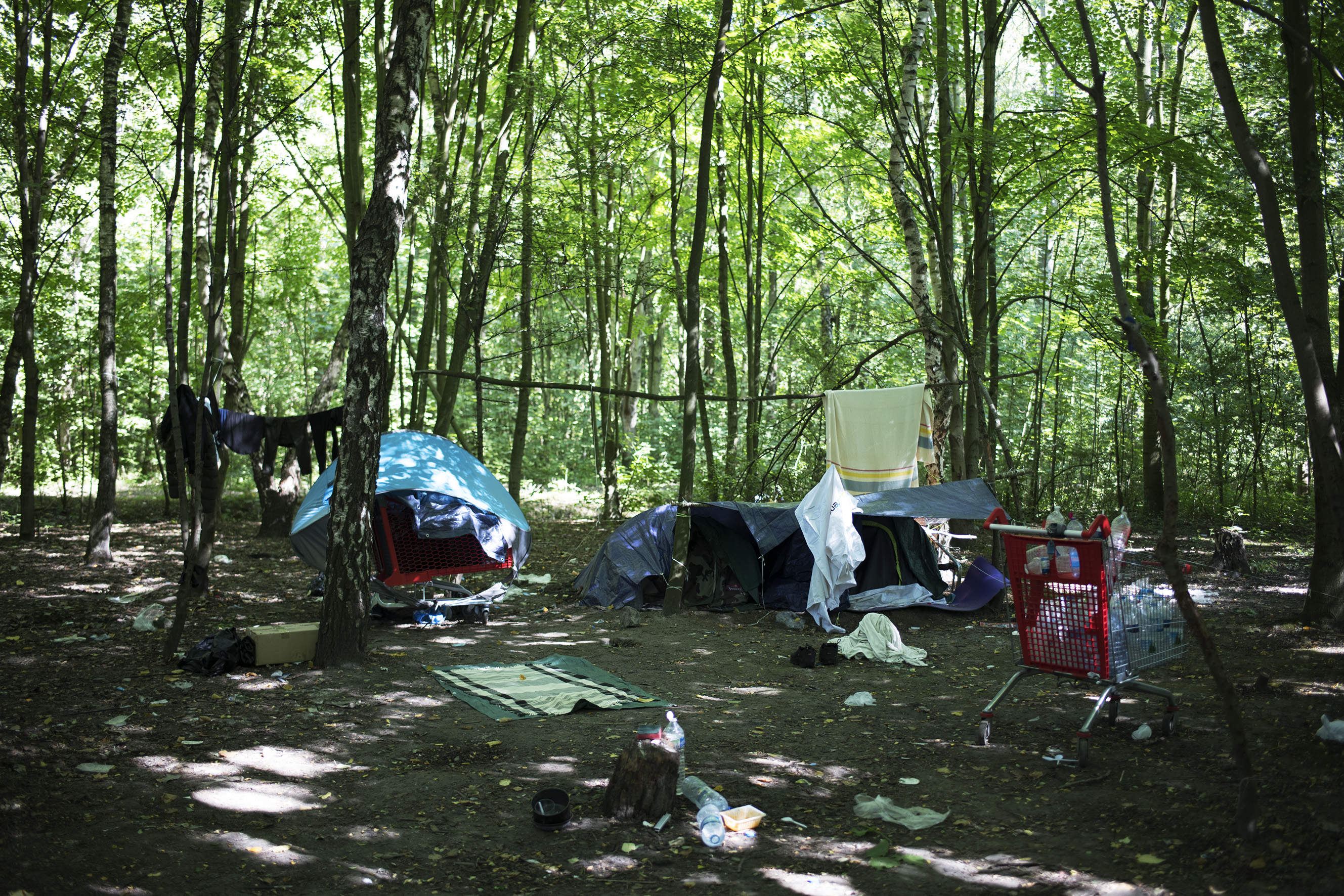
Small camp in Dunkirk, space of living
-
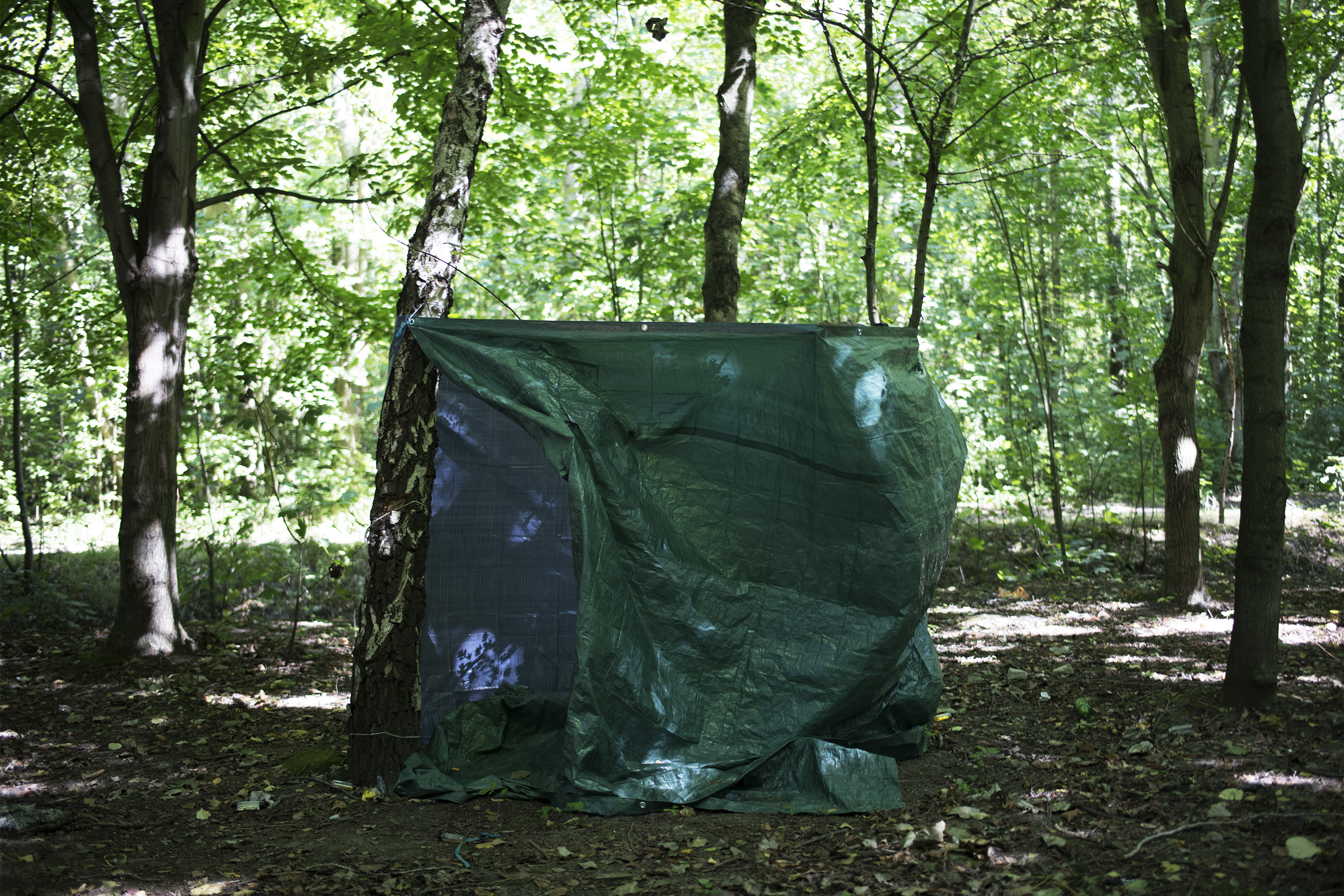
Small camp in Dunkirk, personal bathroom
-
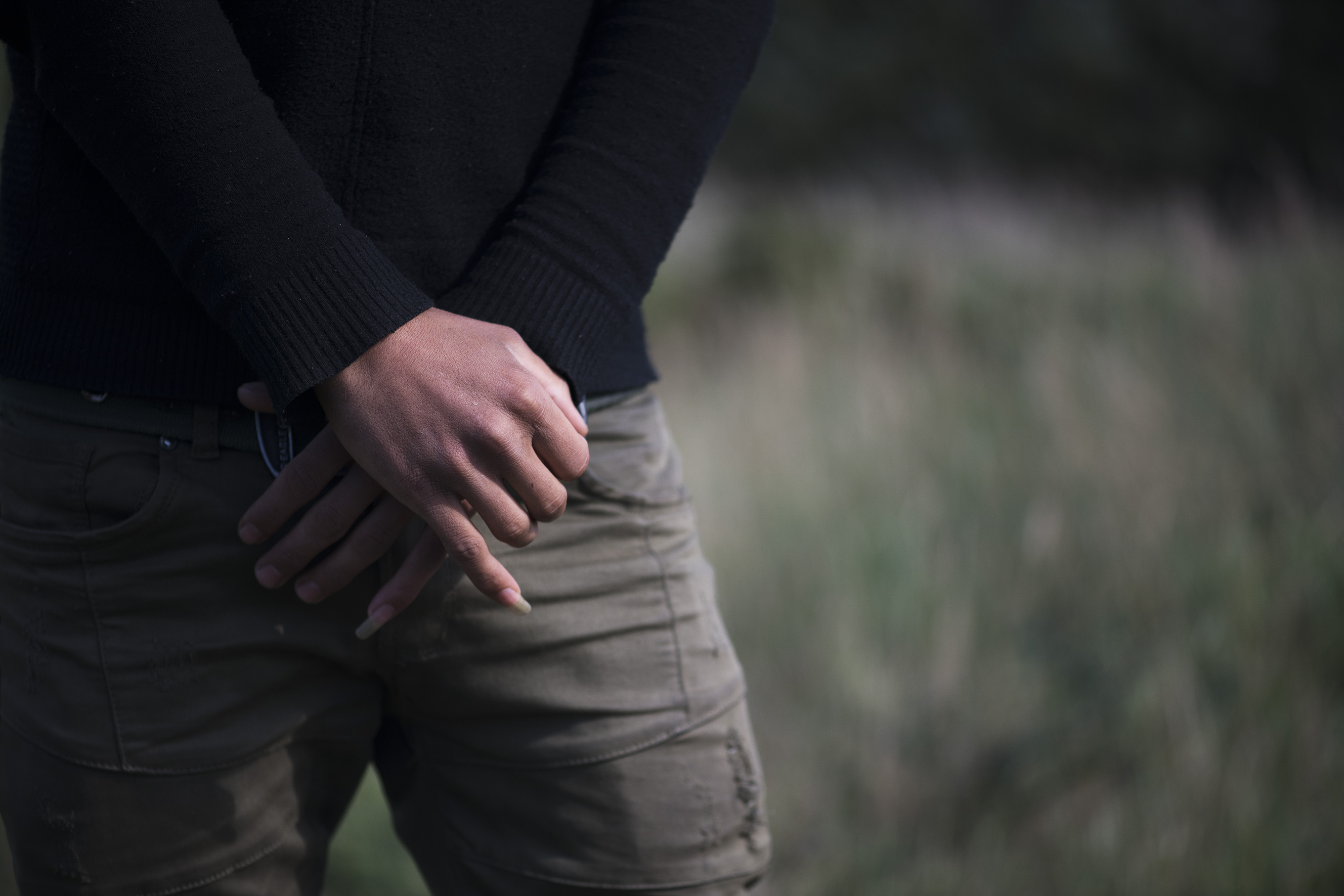
-
« I come from Syria. I left my country six months ago. I am twenty-one years old. I always knew I wanted to leave. I was a bricklayer, constructing houses in my home country.
Syria isn’t a safe place. There is violence everywhere and bombing raids all the time. You cannot have a normal life in a country at war. When you turn nineteen the government oblige you to work in the army and fight for the country even if you disagree with their political decisions. I am a small guy. I didn’t want to lose my life this way. I tried to stay for as long as possible but one day it was too much for me to take. I took my bag, went by car as close as I could to the border with Turkey and then I walked. If you go far away from everything, to the middle of nowhere, you can find somewhere to cross, but you need to walk a long way to avoid the fighting and the military that patrols the area. I walked for one day until I found a car on the Turkish side. The car drove me to Istanbul. I spent two and a half months in Turkey, mainly because of coronavirus. It was in March, maybe April of this year (2020). Everything was shut and it was very complicated to find a boat to go to Greece. I had to stay discreet, so I spent this time just waiting for the situation go back to normal. After two and a half months I finally found a smuggler. We crossed the sea to Greece with ten other guys. I have no idea where we arrived. We walked for ten days together after this, heading north. I spent one and a half months in Greece, trying to find some information on how to continue my journey. In Greece, also in Turkey before, the police were disrespectful especially to us and very violent. One time I was arrested by Interpol and they took my fingerprints to see if I had been arrested before. After this I went to Albania, Kosovo, then Serbia, always following other people. In Serbia I found a smuggler. Together with another group of people we crossed Croatia, walking with him for $1000 each to Hungary, before I found a car to Ukraine. I switched from car to car until I reached Germany, then France.
During all this time I had basically no food and not enough water. Every day you are just trying to stay alive until the following day. You have to make big decisions in just minutes based on meeting someone new or hearing some stories.
I have been in Calais for twenty days. I want to go to England. So much of my family is there; my brother, my cousin, my uncles. My wife and my daughter are the only ones still in Syria.
I tried once to cross the sea to go to England on a small Zodiac boat but the police stopped me.
When I left Syria at the beginning of the year my wife was pregnant with my daughter. She is five months old now and I have never met her. I lost my phone at the beginning of my journey so I have never even seen a picture of her. To support her is one of the main reasons I left. How could I raise my child in an unsafe country ? I wish I never had to leave them. Once I am in England I will find a way for my wife and daughter to join me. They will be safe. They will have a beautiful life in England one day. »
-
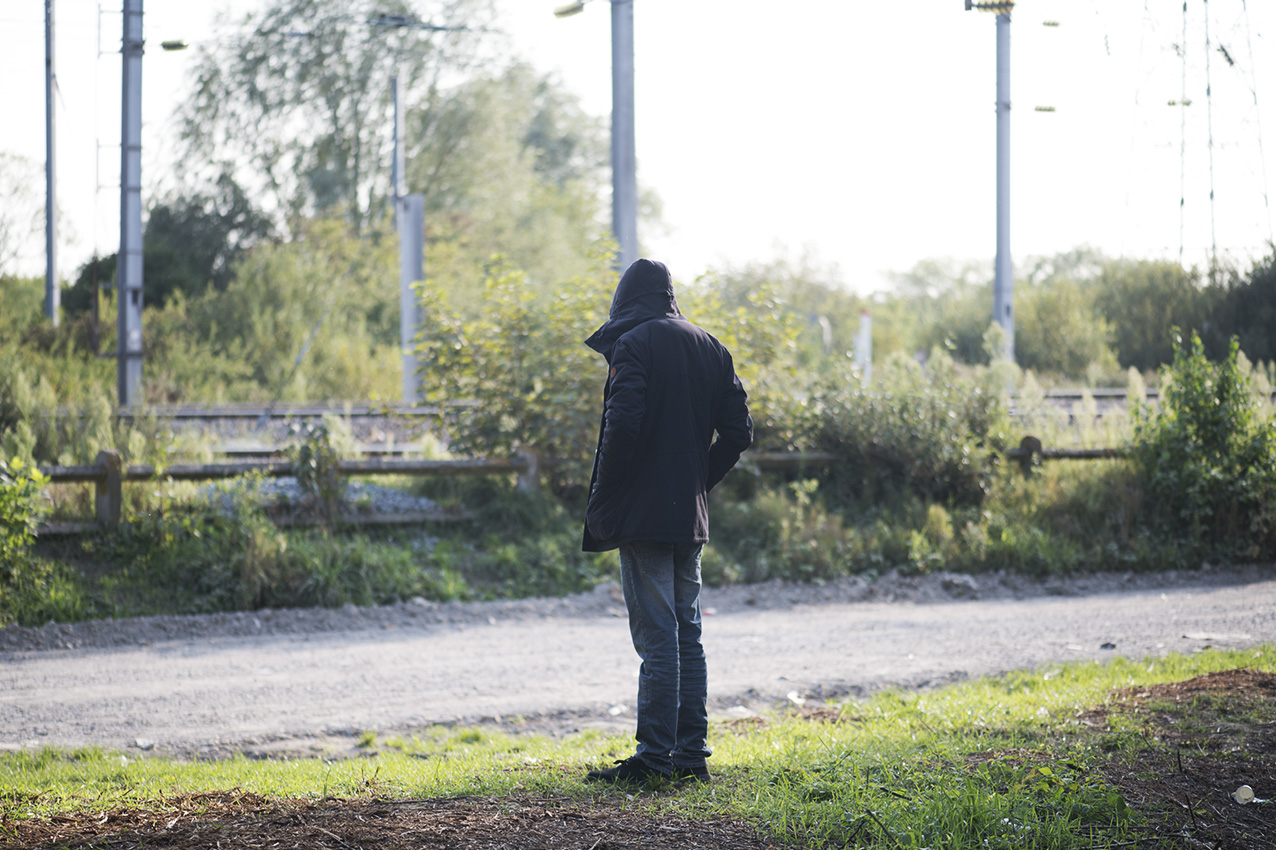
-
« I am 38 years old, I am Kurdish and I come from Iraq. I was a writer and also working in a restaurant in my country. I left one year ago. In Iraq life is very difficult for us. The government and the politicians own all the riches. The system is working as a mafia; they take everything and they control the people. If someone in the government or linked to the government wants a weapon he can have it. If he wants to kill someone he can. If he wants to start a war he can. Prison is a threat only for poor people. You wouldn’t believe the system in Iraq. As a Kurdish person you are on the lowest rung of the system.
There you are not allowed to have any freedom of expression. Many journalists were killed because they were talking about the problems in the government, showing they were taking all the money from the people and not caring about the good of the population. Working as a writer, writing about my life there and telling my story, as well as writing about the system, made it unsafe for me there.
If you are represented by a political party, with people behind you, you can be protected and listened to. But on your own you are nothing. In the north of Iraq we are six million Kurdish people. I consider this area a small country in Iraq. The problem is that the Iraqi system is corrupted but our’s is too. We have politicians, we have a Kurdish political system, but you cannot count on it. All the money from petrol disappeared and the politicians became billionaires but the rest of the people are still living in deplorable conditions.
In my country I didn’t have a salary. The government controls the majority of the people salaries and they can choose to take your money “for the country”. One month you can see your salary divided in two, they just take your money, it’s normal. Unemployment is very high, so if you have a job you already feel lucky.
In Iraq we have petrol but we don’t have regular access to electricity. Basically every day electricity is cut off for at least ten hours, sometimes twenty hours a day. The national grid doesn’t work but the government does nothing to repair it. Access to water is also very limited and irregular.
I left Iraq by plane to go to Turkey one year ago. I had my Iraqi passport so it was easy to reach Turkey. It cost me 800 dollars, which is very expensive when a good salary in Iraq is around 400 dollars a month. From Turkey I sent my passport back to Kurdistan. I knew my travel would be difficult and I would need it in the UK to show my nationality and obtain the asylum papers. When I get to England I will ask my family to send it to me.
I found a smuggler in Istanbul and we went to Greece by car with some other people. We paid the smuggler to drive us to Thessaloniki. He knew the way to cross the border avoiding security controls. From Thessaloniki we took the train to Athens. I spent two months there, then I went to Macedonia, Serbia, Bosnia, Croatia, Slovenia and Italy, paying different smugglers to cross borders with groups of people, before I arrived in France. I have been in Dunkirk for twenty-five days.
I tried to cross two times already. The first time there were twenty-two of us on a small Zodiac boat. I saw when we were leaving the coast that we wouldn’t all be able to make it together so I got off the boat to let others have a chance to make it. The second time there were also more than thirty people but this time I tried; we finally had to go back after a few kilometers because water was coming into the boat.
I have my uncle, my aunt and nieces in England. Many of my friends are there too. For twenty years my family has been going to the UK to find better living conditions. »
-
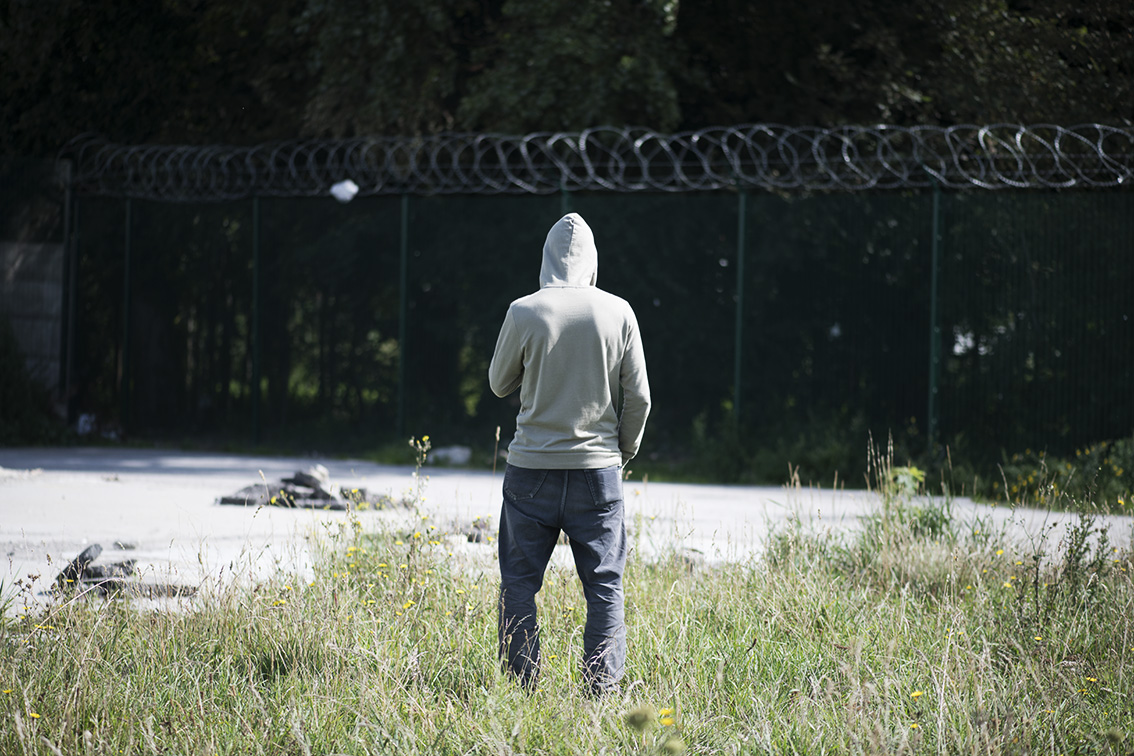
-
« I am 30 years old and I was born in Iran. I was a tailor who made children’s clothes. I left my country in 2015 because I am Christian and to be from a religion other than Islam in Iran remains a cause of persecution. On the day of my departure in 2015 a car took me to the border with Turkey, in the mountains. From there I walked for hours to Van, one of the first cities after the border, where I found a car to take me to Istanbul. After this I left for Canakkale, on the west coast of Turkey. After wandering for days on the coast I found a smuggler with a Zodiac boat to take me to the Greek islands. The journey should have only taken a few hours but I had try to four times before I arrived in Greece. For every attempt the smuggler requested at least a thousand dollars. The first time the boat split open. Two other times water got into the boat and we sank because of the waves. The fourth time I finally set foot in Greece. I spent two weeks there, then I went north to Macedonia. After that I crossed many countries, I don’t know which ones, before I arrived to Germany. In 2015, when many immigrants left the Middle East, the police were more tolerant than now. In Greece some organisations helped collect papers for us, explained our situation and I was able to travel to Germany legally by train. I spent two years in Germany. After two years they refused to grant me asylum. For two years you cannot work, you cannot travel, you cannot find accommodation because you don’t have any papers. You put all your hopes in those papers so it's very tough to be refused. I travelled to Calais to try to get to England, where it’s easier to get asylum. From Calais I tried to cross the sea many times, by boat, in trucks, but I have always been stopped. I tried in Belgium but the police stopped me and sent me back to Germany. Because I gave my fingerprints when I asked for asylum, if the police catch me, they will always send me back to Germany. I was tired and felt like a prisoner of my fingerprints. I spent another year and a half in Germany but again they refused me asylum. I went back to Calais two times - they sent me back in Germany both times. I tried to cross to Jersey but again the police sent me back in Germany. And now I am back to Calais again. I have been here three months. I think I have spent one year of my life in total in this city, moving between different camps to avoid the police evictions. I still want to go to England. I want to join my brother. He lives in Birmingham.
I left my home in 2015. My life stopped the day I left. I have lost five years, but I will continue to try to reach the UK. No matter the risks. »
-
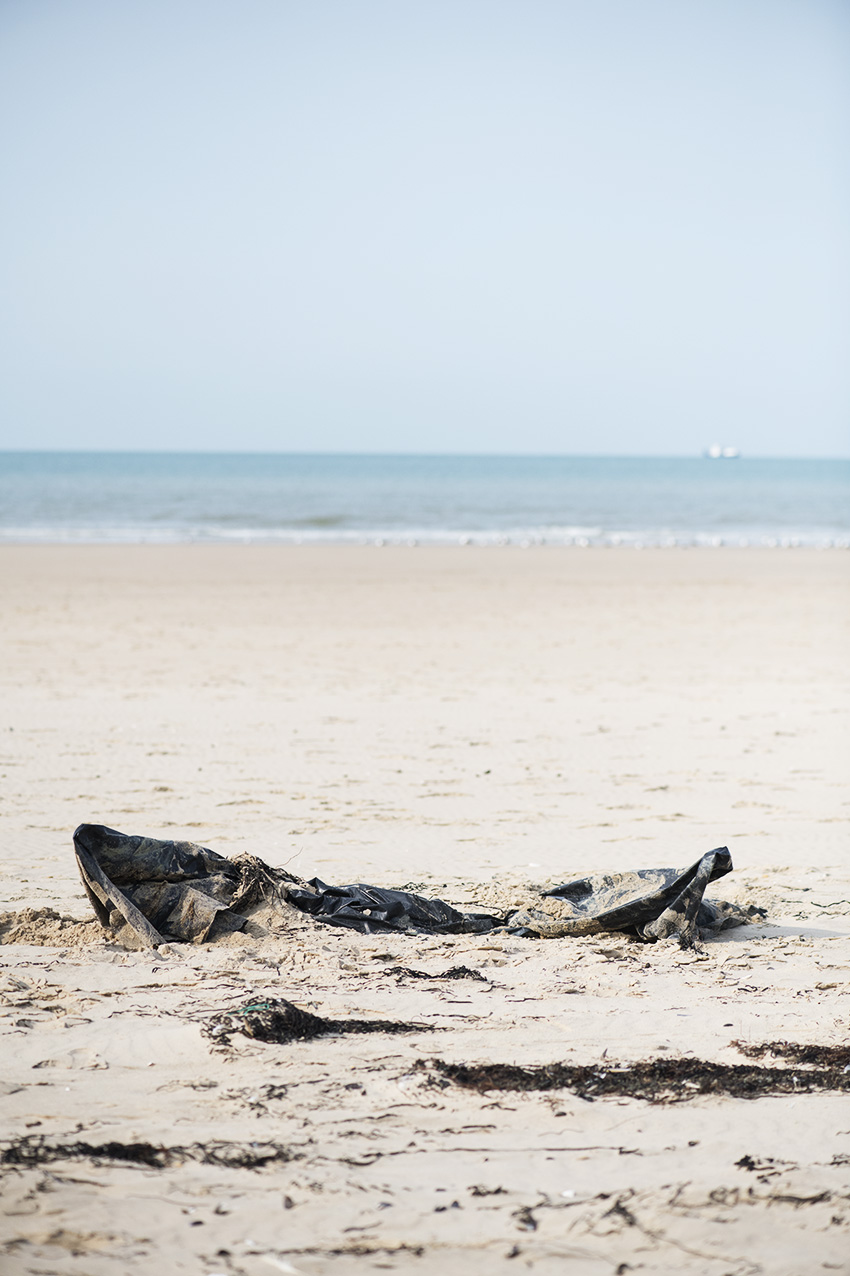
Inflatable boat buried in the sand, Sangatte beach
-
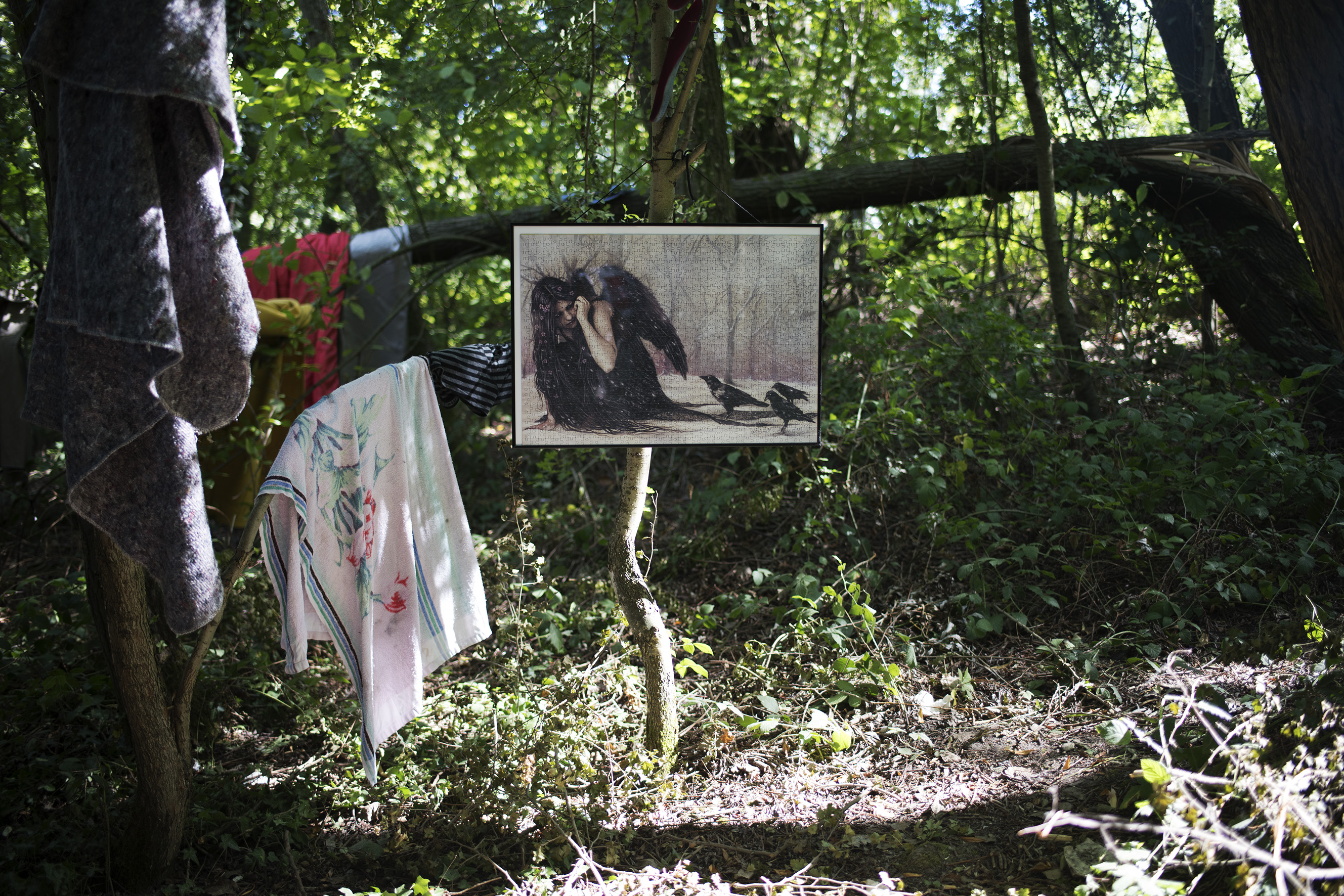
Small camp in Dunkirk
-
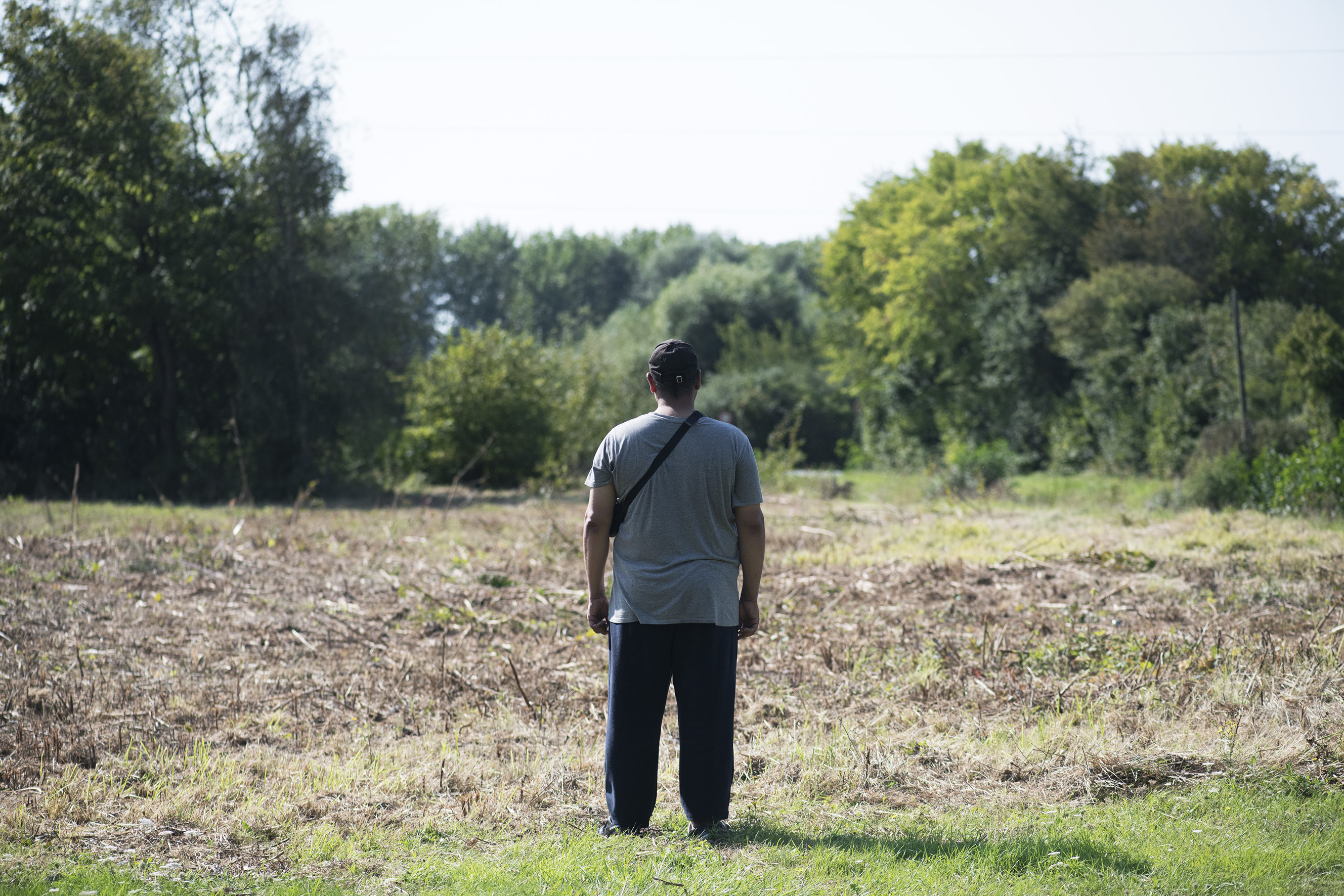
-
« I am 40 years old and I come from Koweit. In my county I didn’t have any right, I wasn’t equal as the citizens there. I didn’t have the right to go to school, to study or work, I didn’t have any paper and no right to medical assistance or no possibility of travelling.
The government says we belong to Irak. My great grandfather was from Irak, all the old people in Koweit actually come from Irak. Civilizations are existing in this country since 6000 years but Koweit only started to be a country in 1961. At this time, the government prevented a minority of people, around 200 000, to have Identity papers. This population coming from immigration, came in the country to work, they haven’t been registered when independence was declared, and they are now without papers. I was born in the capital of Koweit, but as a son of someone without papers, me too I don’t have it. As my family, I couldn’t go to school, work or go to the hospital. I am an human with nothing, no name, no birth date, no rights.
I left Koweit a bit more than 3 years ago. I went to Turkey. Someone in Koweit helped me to get fake papers to be able to take the plane, which is very risky if someone realizes it’s fake ones. In Turkey I changed my passeport to another fake passeport and two weeks later I flew to Germany where I spent one month. I decided to go to Sweden because I heard many people saying that over there you can have human rights, you can become a normal person, equal to the others. I spent 3 years in Sweden, where I asked for Asylum. For two years they didn’t answer to my case, after two years they refused. I also have big health issues that require medical assistance. For all my time in Sweden they told me I couldn’t have this medical help because I don’t have a residence in Sweden, but if you don’t have papers you cannot have a residence, and you cannot work to pay for this medical assistance. All this time I was just living in camps, as in Dunkirk. I heard some stories telling that France could be better for me, at least to have the medical help I need. I took a train to Danemark, then Germany and France. In Germany the police stopped me a few times, but I said I was going to France, and they gave me a paper allowing me to stay for 24 hours each time. When I got to Dunkirk I decided to get my Fingerprints taken there, because at least in France I can go to the hospital - the fingerprints link you to the country which took yours, it becomes the one responsible of you, if you are caught by the police somewhere else, they send you back to this country.
France helps me, I got financial help there, medical assistance, but you can wait for the papers for years without any answers. I want to go to the UK, there you can have papers in only 2 or 3 months. I am in Dunkirk since one month and one week. I tried once to cross to England, on a small boat, one of my friends let me go for free, but some water started to get in the boat, and we had to go back.
I will try again, but I know that with the Brexit it’s gonna be more complicated very soon, everyone wants to cross in the coming weeks and the police increased the harassment and the violences. If I can’t I will stay in France, I actually like the country, but I don’t want to loose at least two more years of my life waiting for an answer.
All my family, my 9 brothers and sisters, are in Europe now, my sisters are in the UK, I also have family in Danemark, my parents are in Turkey.
I feel very lucky because here in Dunkirk I’ve got a tente, many organizations are coming to help us. I spent all my life as a person without papers in my country, running from camp to camp all over Europe, I learned to be happy even in this situation. I wish I can cross to England, have my papers, then be free to travel. I would love to come back to France one day to study French. I am 40 years old and I have never been to school. I can’t wait to be able to study one day. »
-
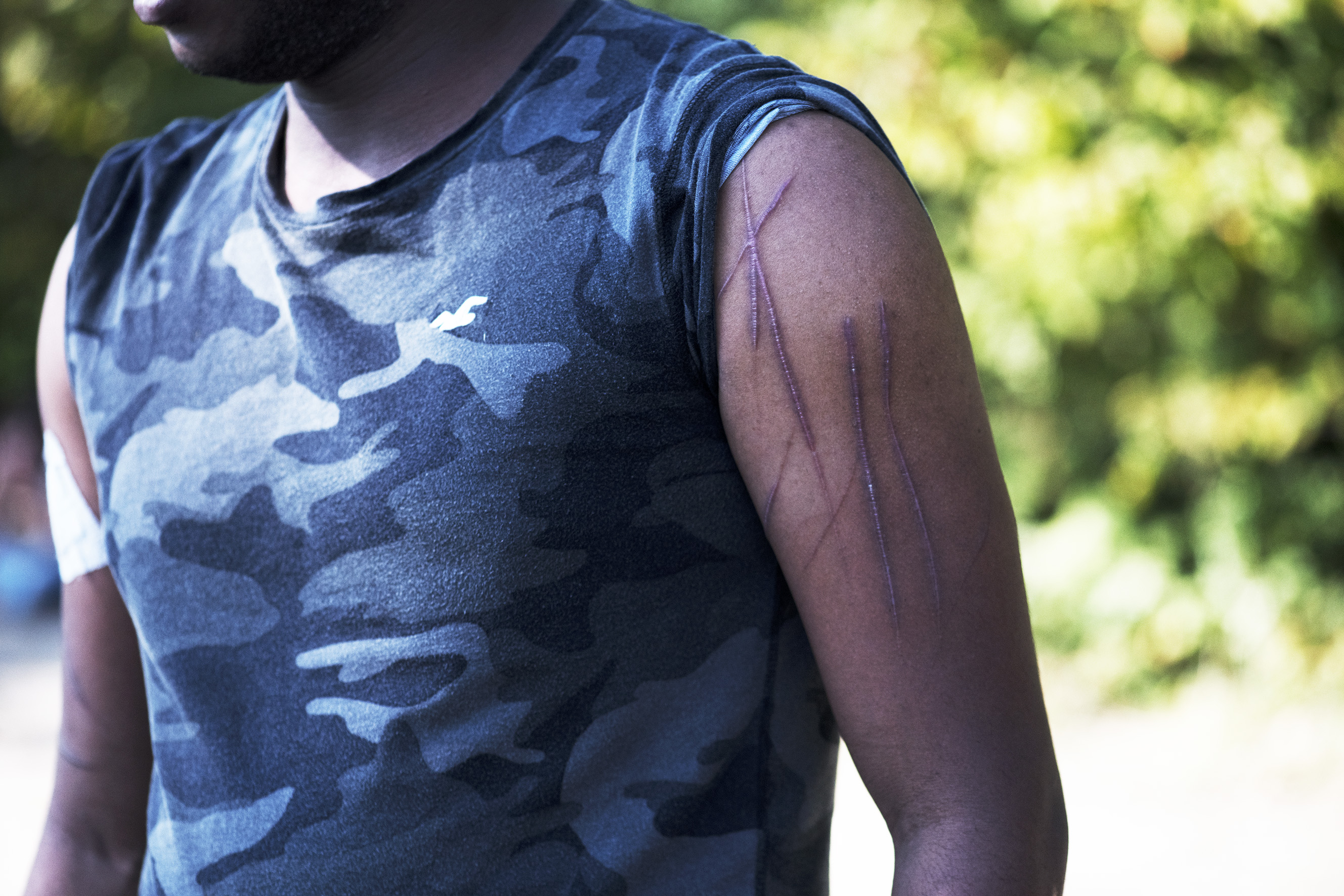
« I am Kurdish and I come from Iraq. I managed to cross to England a few weeks ago. Once there, the police arrested me and put me in jail. When I was in jail I knew they were going to deport me very soon so I cut both my arms and both my legs with a blade so I would be taken to a hospital. I spent seven hours in the hospital and they put me in a wheelchair. The next morning they deported me by plane to France. »
-
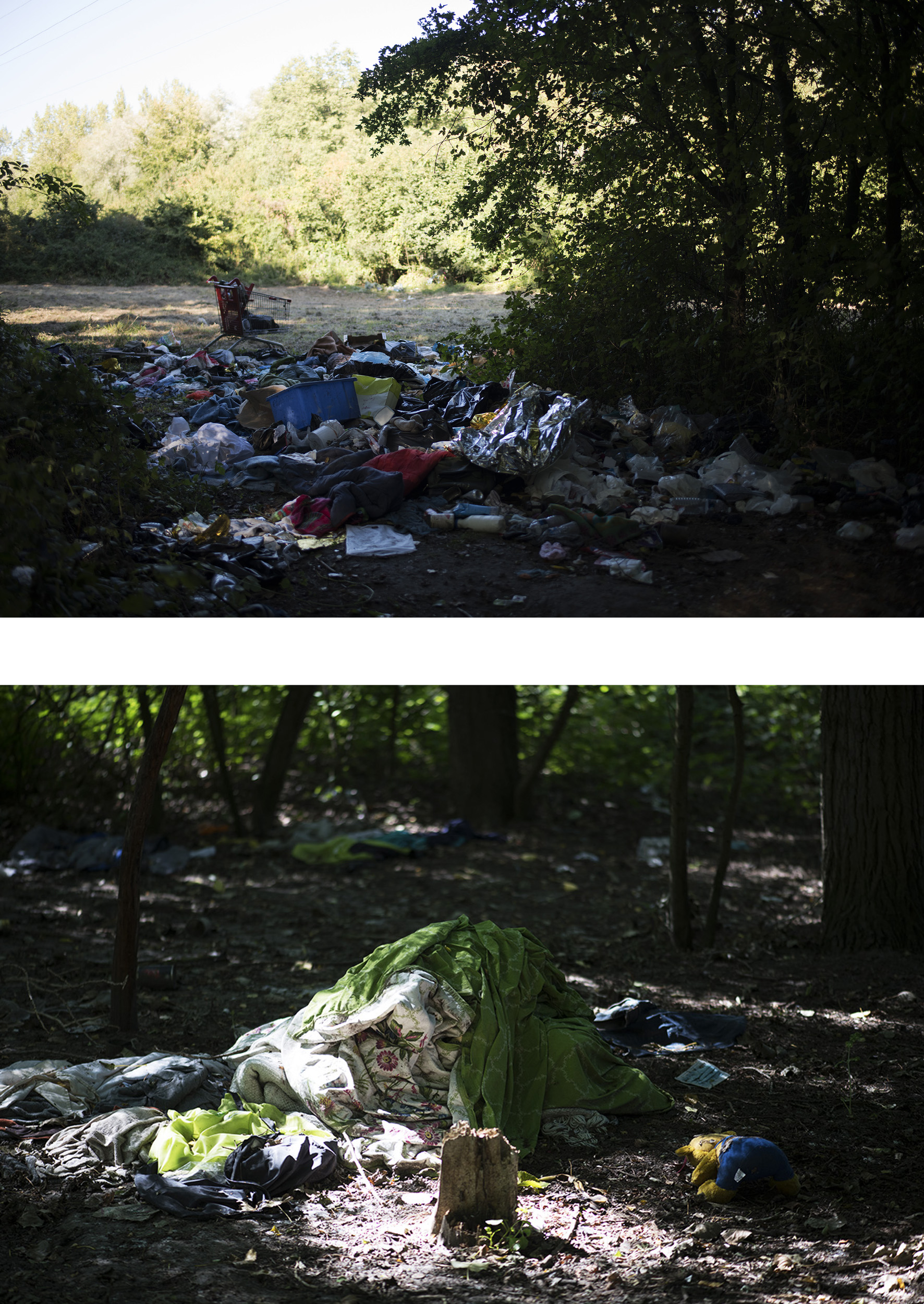
Belongings after an eviction by the police, Dunkirk
-
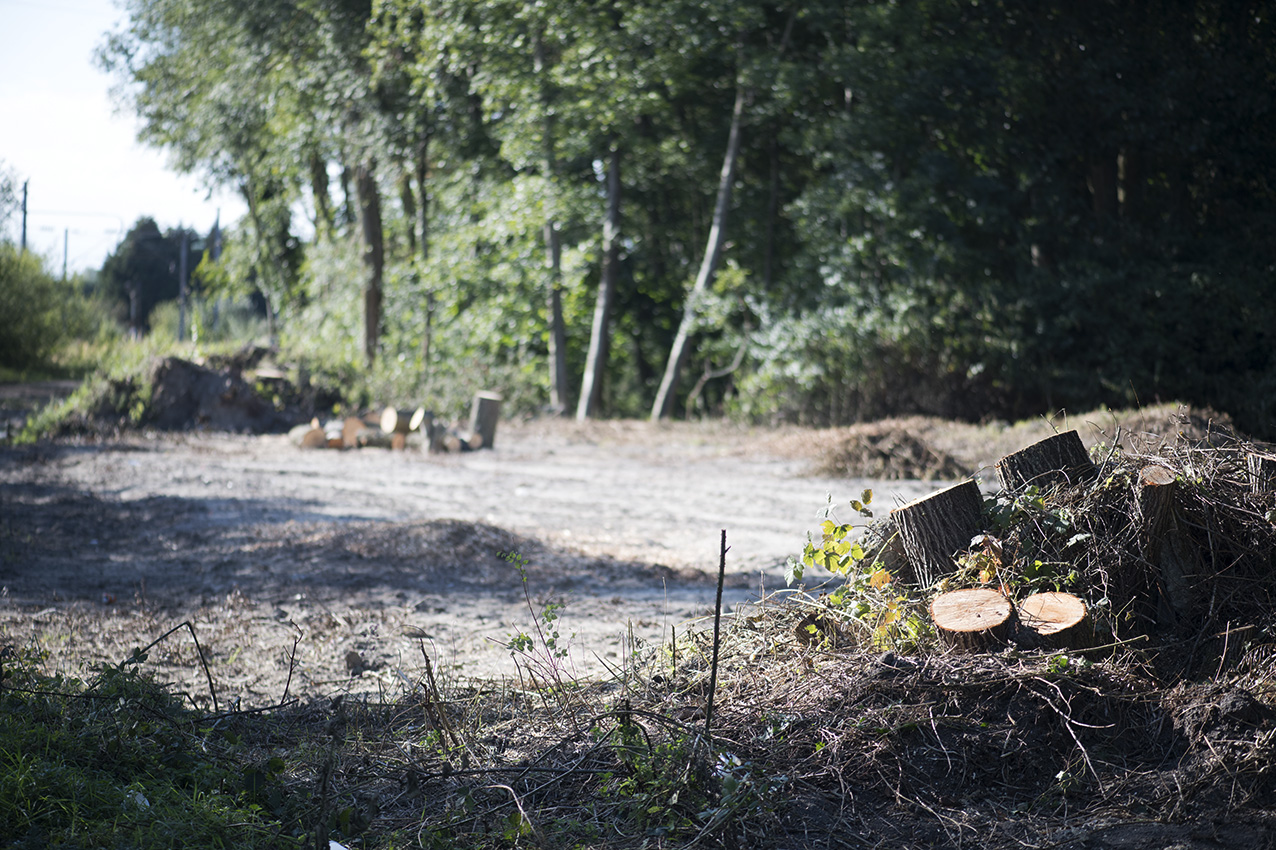
Area « cleaned » after an eviction by the police - trees cut to avoid new camps installation, Dunkirk
-
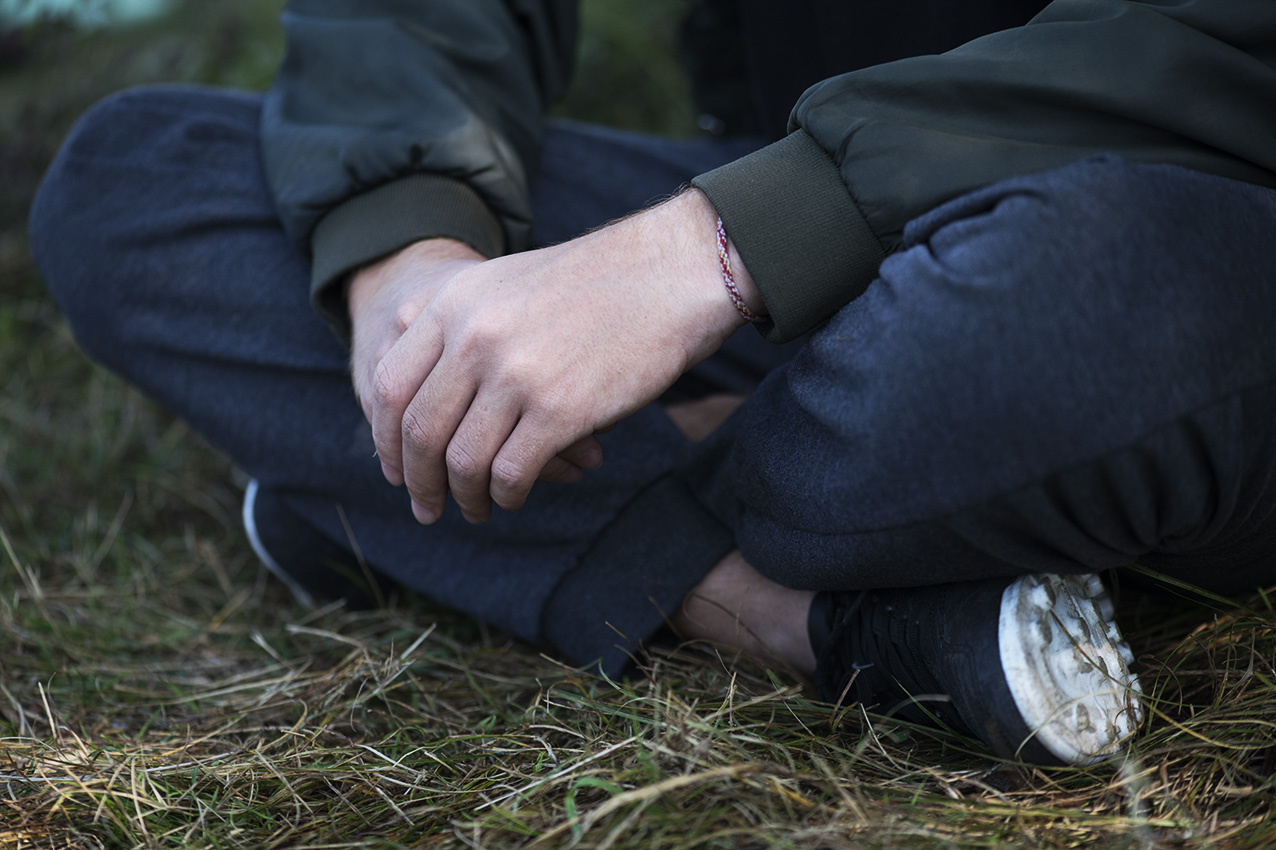
-
« I am 18 years old and come from the Kunduz province in Afghanistan. I left two years ago, in 2018. Our province is the most dangerous one in Afghanistan. My district Khan Abad was taken by the Taliban in 2016. The Taliban control everything there. Even the police are not allowed into the district. There is no law and no humanity under the Taliban. I remember once during an attack a bomb exploded. My friend was killed. I had to take his head in a plastic bag and bring it to the police. We were children, less than 15 years old.
I studied in Kabul therefore I was moving a lot between my home district and the capital. Once when I was travelling to Kabul the police stopped me and accused me of working with the Taliban. When I was returning home the Taliban initially refused to let me back into my town because they thought I was working with the police. Being able to travel is already very complicated in my country, but I have another difficulty: my skin is pale, my eyes are blue and my hair is blond. My brothers and sisters also have the blue eyes of my father but I don’t know why my hair is blond. All my life people have looked at me as a foreigner in my own country. Once the Taliban caught me and thought I was from America. They didn’t believe I was from Afghanistan. Only after calling my father did they release me.
My father is a taxi driver and the Taliban used to put pressure on him and forced him to use his car for their deliveries. Once they came to my father and told him they knew I could speak English and I knew computer science and how to use computer programs. They wanted me to work for them. They told him it was a kind of Djihad - religious duty in Islam - and I had no choice. They were going to force me to work for them. My father told me to escape, to leave the country. He told me I was the only hope for my three sisters and my brother.
My sister was studying in Kabul but when the Taliban took control of my district they said it was forbidden for girls to go to school so she had to stop her studies. All my family is still in our province because my sisters and my mother are not allowed to work and my brother is very young. My father was the only one making money for our family but he developed big health troubles and he can’t work anymore. I am here in Calais, trying to cross, and I know I need to get to England quickly so I can work and send money to my family. In Afghanistan I studied until the 9th grade before the Taliban created too many problems. After this I worked as a taxi driver for my father. I studied on my own and took some extra classes on computer programming and I started to work for a company when I was 15. That is how the Taliban discovered I could be useful to them.
The day my father and I decided I should leave I took a small bus to Pakistan. There were maybe thirty people on the very small bus. All of us then got off the bus and walked for 30 hours. From Balochistan - one of the four provinces of Pakistan - I went to the Iranian border. There some Taliban members were guarding the border.
They let everyone go past but when they saw me they stopped me. They didn’t want to believe I came from Afghanistan because of my blond hair and my blue eyes. They held me for two hours and were very violent. They told me I was an agent working for the government. After they finally let me go I crossed into Iran. I spent twenty days crossing the country to get to Turkey. Near the border I found a smuggler with a group of people who also wanted to cross the border. We walked for seventeen hours in the mountains, in the snow. It was so cold. One hundred people started the journey. Forty made it. The others had problems in the cold. I saw one man die on the way.
I spent three months in Turkey. I worked for two months in a kind of factory making bags for girls to make money. I then walked for thirteen days from Turkey to go to Bulgaria. In Bulgaria the smugglers left us in a jungle - refugee camp - telling us they would come back in a few hours and bring us food because we didn’t have any food left. They came back four days later. We were exhausted and some people didn’t have the strength to stand up. Just two minutes after the smugglers arrived the police also arrived. I am convinced they told the police we were there. The police caught us. For 24 hours we were in jail. They checked the ages of everyone. If you’re young they send you to an open camp, if you are over eighteen they send you to the closed, controlled ones. All of us were under eighteen, but when one guy said he was 15 they beat him and asked him again. He didn’t answer that time. They wrote 21 on their papers and sent him to the closed camp. I was 16. Luckily they believed my age and they sent me to the open camp.
I spent eight days there. I remember this time well. It was Ramadan and I was fasting with nine of my friends. One evening we went to the mosque and a group of young Bulgarian people ran at us with knives and tasers. They beat me and one man cut me with a knife. I ran and I saw the police at the entrance of the camp. They just told me I shouldn’t go out of the camp. Sometimes a lawyer came to the camp. She advised me to leave Bulgaria because I look Russian with my blond hair and the Bulgarian people hate them so they would always cause me problems. The police stopped me another time in Bulgaria and they kept me for seven hours, beating me, asking if I was an agent. Again they didn’t want to believe I was from Afghanistan. Finally a few Afghan translators came and I talked with them. I told them about my province in Afghanistan and they finally let me go.
I decided to leave quickly to Serbia. I spent one and half year in Serbia, trying to get to Hungary by train with some others. The police caught us several times and deported us back to Bulgaria. Finally, a few months ago when the lockdown finished, I tried to leave in a truck full of goods. Fortunately the truck crossed the border. We didn’t know which way it was going and we had no food inside. One of the guys with us was only 13 years old and began feeling very bad due to lack of food and water so we had to leave the truck. We were in the Czech Republic. The police came and caught us. Again they checked our ages and they sent us to camps but we had all had our fingerprints taken in Bulgaria before so they deported all my friends who were above 18 years old back to Bulgaria. They decided to deport me too. I appealed but the judge still decided to deport me. I spent forty-five days in a deportation center and I appealed again. This second time the judge decided to release me. They gave me papers allowing me to stay in Bulgaria for seven days. I travelled to France via Germany. I arrived in France twenty-one days ago.
I have already tried to cross to England two times on small boats. One time the police were close to the beach and we couldn’t do anything. The second time we were two boats crossing together. Our boat was fine but on the other boat behind us somebody screamed for help. There were families and children inside so we went back to help them. The police arrived.
Here in the camp when I arrived I met a group of people from Afghanistan. When they learnt were I was from there they started to be very mean, insulting me because of the way I look. The same problem is following me everywhere. Luckily I have some friends in Calais I met during my journey and I know I can count on them.
I have family in England. My cousins have been there for ten years. They said I can come to them and they will help me. Right now they are the ones who are supporting my family. They send them money because here in Calais and during my journey I couldn’t work to support them. My cousins also send me money to help me pay the smuggler so I can cross to England. I know they have used all their savings from the last five years in order to support my family and help me join them. Now I want to go to England, pay them back and be the one to support my family. »
-
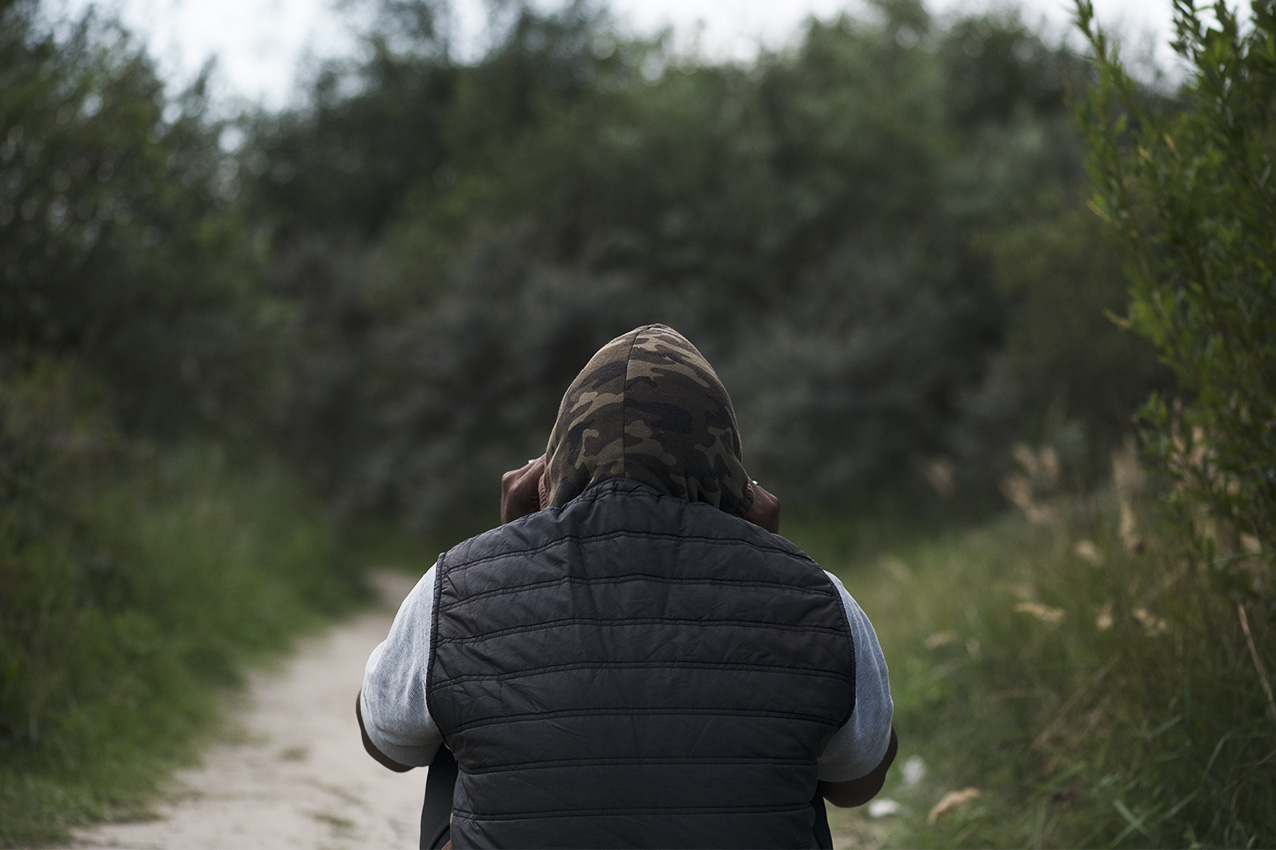
-
« I am 28 years old and I was born in Darfur, West Sudan. For many years the situation in Darfur has been very complicated, as a part of Sudan with many different ethnicities fighting for land. I left Darfur in 2016 because it was too dangerous. Many villages that were non-Arab were destroyed, burned. Thousands of people were killed. The Sudanese army wants to impose the Arabic ethnicity as the ultimate one in Sudan.
There we don’t have any protection and we cannot access social media to communicate about the situation. Since 2003 and the beginning of the war in Darfur, minorities have been persecuted and killed. I first moved to Khartoum, the capital of Sudan, to escape the fighting, but the situation was still very difficult for me as a person from Darfur, so I decided to leave the country. I first went to Libya. After a few days living on the street in Libya some people from a criminal gang kidnapped and imprisoned me, asking for money to let me go free. I said I didn’t have any money but they kept me prisoner for seven months. After this time they understood I was coming from Darfur and I couldn’t pay the ransom and they let me go. If I had come from somewhere else they would probably have kept me longer.
For all this time they beat me every day and gave me the minimum food to stay alive, sometimes nothing.
As soon as I got my freedom back I tried to leave the country. I found a smuggler with a small boat and along with many other people we crossed the sea to Italy. I thought there I could have some protection. When I arrived the police immediately caught me and took my fingerprints. They didn’t give me a choice. They said thatif I refused I would be put in jail. During my stay in Italy I was living in the street, sleeping on cardboard boxes and eating food I found in the rubbish. I didn’t know the location of the refugee camps at this time. I didn’t want to stay in Italy where the police had been aggressive towards me. I didn’t feel safe there so I left to go to France. I walked for days. Sometimes I took trains but I had to hide because of the police controls. I am in France since two years now.
I successfully got to the UK one time, from Belgium in the back of a big truck on a ferry. I asked for asylum in Birmingham. I spent nine months there. After nine months they deported me to Italy. I went back to France and I asked for asylum there but they said I couldn’t have anything in France before the UK made their asylum decision. I had been waiting for four months in France before the UK finally rejected my asylum. I appealed against the decision and they rejected it a second time.
I have the feeling I’ve lost four years of my life and I don’t believe in European protection anymore. The Dublin Regulation - according to the Dublin Regulation, the first country that an asylum seeker enters is ultimately responsible for an individual’s asylum application - they take your fingerprints, you have no choice, and after this you are a prisoner of a country which may not give you an answer for years.
In the two years I spent in France the police have never stopped increasing the level of harassment towards refugees. The police are always around us, all the time. You cannot sleep at night; you’re just scared the police will come for a new eviction.
I will go to England. I want to finally get the protection and the safety I have been seeking for years. »
-
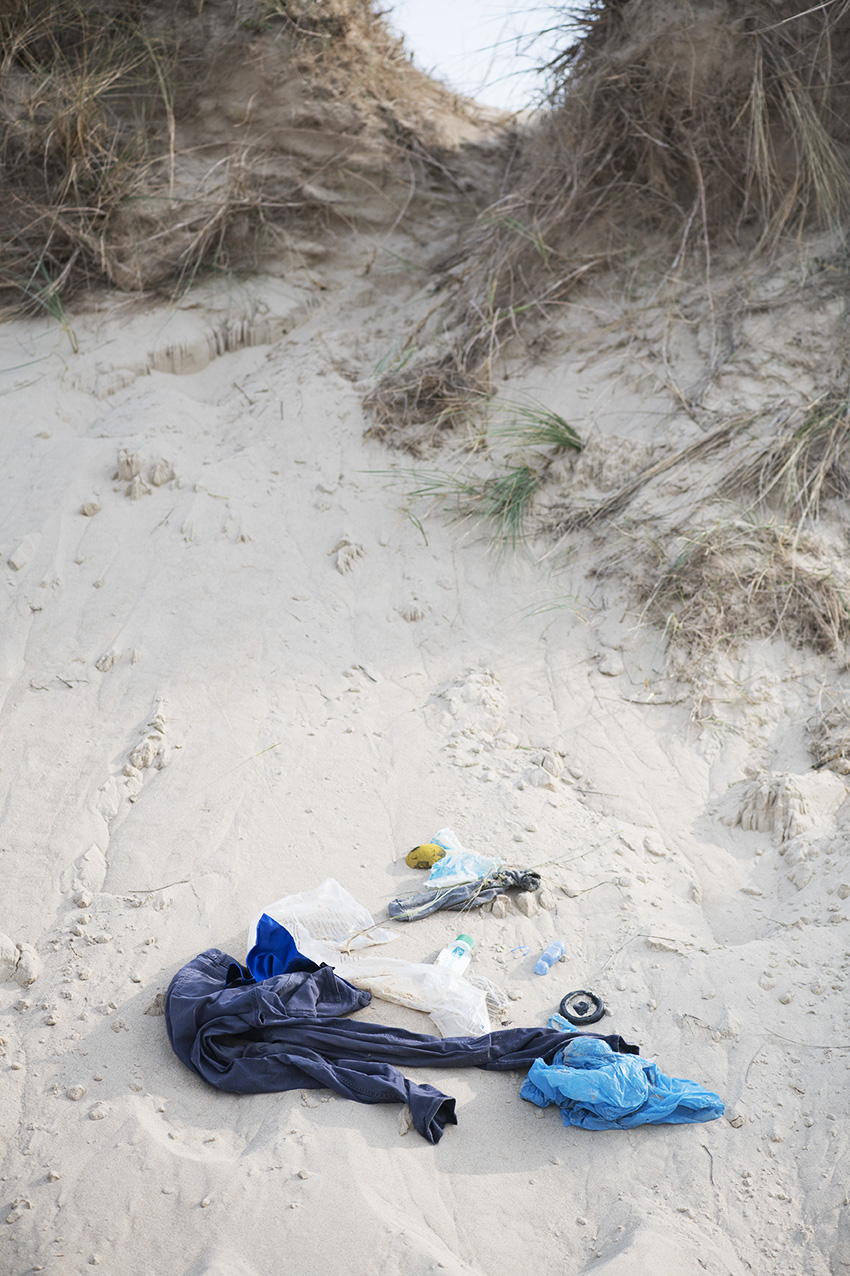
Personal belongings on Sangatte beach
-
More than ever, people in the Calais Jungle are dreaming of England. After a difficult year marked by the coronavirus lockdown and Brexit, crossing the Channel has become much more complicated. The refugees hear stories that England is the best place to go. There, they believe, they can get asylum papers within two months. Sitting in front of their tents and tarpaulins in the BP Jungle camp, they dream of England as a place where they can have a stable job and accommodation. They think about the jobs they have always wanted to do and believe that in the UK they will be able to pursue their dreams. England, where their families will be able to join them once they are set, something that was not possible in all the previous countries they have been to. More than anything, it is their last chance, the final stage of their journey after they left everything they ever knew behind them. Their last hope after the violence they found in Eastern Europe, the contempt experienced in Italy or Spain, the disappointment found in Germany, Sweden and France.
Sadly, once on the other side of the channel they only find more disappointment. If, after risking their lives on the crossing, they managed to evade the police, jail and deportation, they can apply for asylum. While waiting for the verdict the only jobs they can get are illegal ones, often in the worst conditions with terrible pay.
About family regrouping : French organisations working with unaccompanied minors report that the procedures for joining your family in the UK have been a dead letter for more than two years. The Home Office recorded that more than 23 000 refugees and asylum seekers entered the detention estate in the year ending March 2020. After they apply for asylum people often have to wait for more than six months for an answer. From March 2019 to March 2020, the UK saw more than 35 000 asylum applications. The country granted asylum to 12 863 people (8000 others were offered another form of protection). In comparison, France granted protection to more than 42 000 persons in 2019, and Germany ahead granted protection to 116 200 persons (39% of all the positive decisions in the EU - eurostat).